So I’d like to talk about the Bioshock series as a whole. With the perspective of a player that simply enjoys the diverse experiences offered by the series.
Bioshock
If you’ve never played BioShock, I’m dearly sorry. It’s an amazing game series that casts a long shadow in the gaming industry. Each of the three bring something special to the table and you can’t go wrong with playing any of them. I strongly suggest you play through the games before reading this retrospective, as there will be some spoilers for the entire trilogy.
With that out of the way, BioShock (Usually) has a great many options a player may take. Offering quite a lot of replay value for what is mostly a series of linear shooters.
The lore of Rapture (BioShock & BioShock 2)
BioShock & BioShock 2 take place almost entirely within a seemingly impossible city upon the bottom of the North Atlantic ocean, built by an eccentric and personable objectivist businessman named Andrew Ryan.
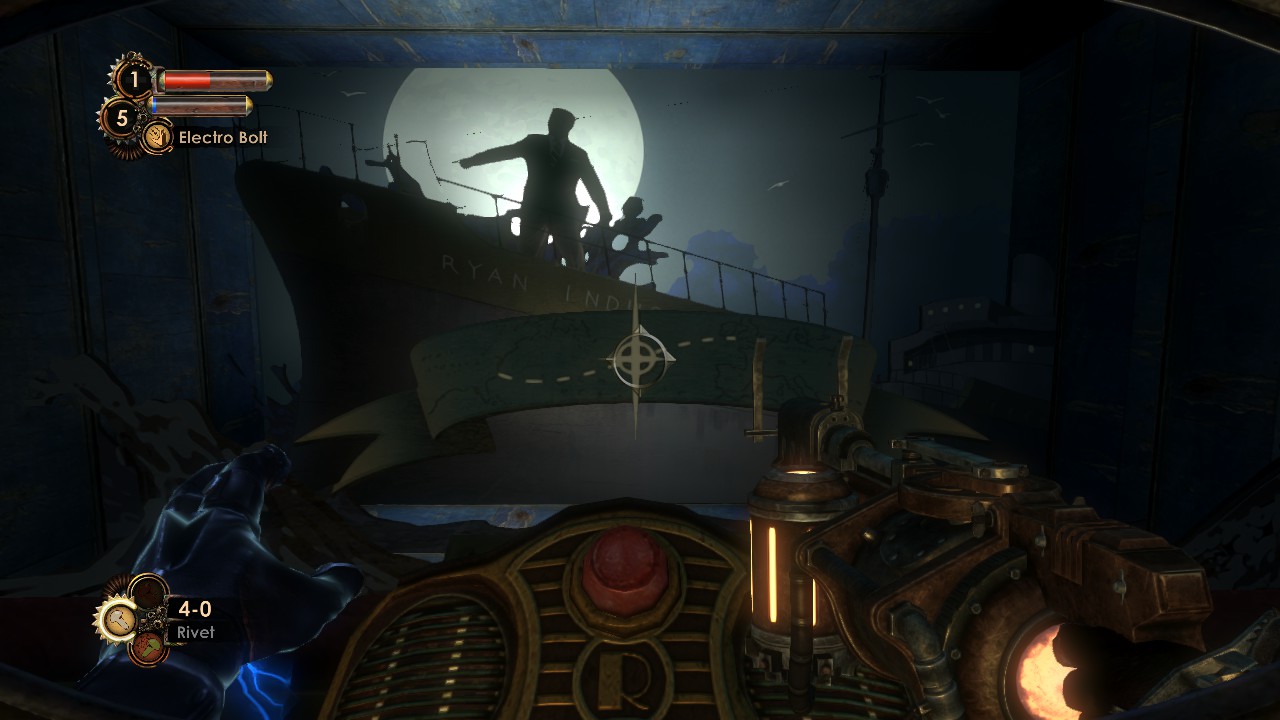

He named the city “Rapture” and filled it with the brightest minds in all the world, creating what should have been, at least in theory, an objectivist utopia. The Rapture setting is in many ways the centerpiece of the BioShock trilogy, even in spirit for the third entry, which occurs in another timeline in a different but deeply reminiscent place.
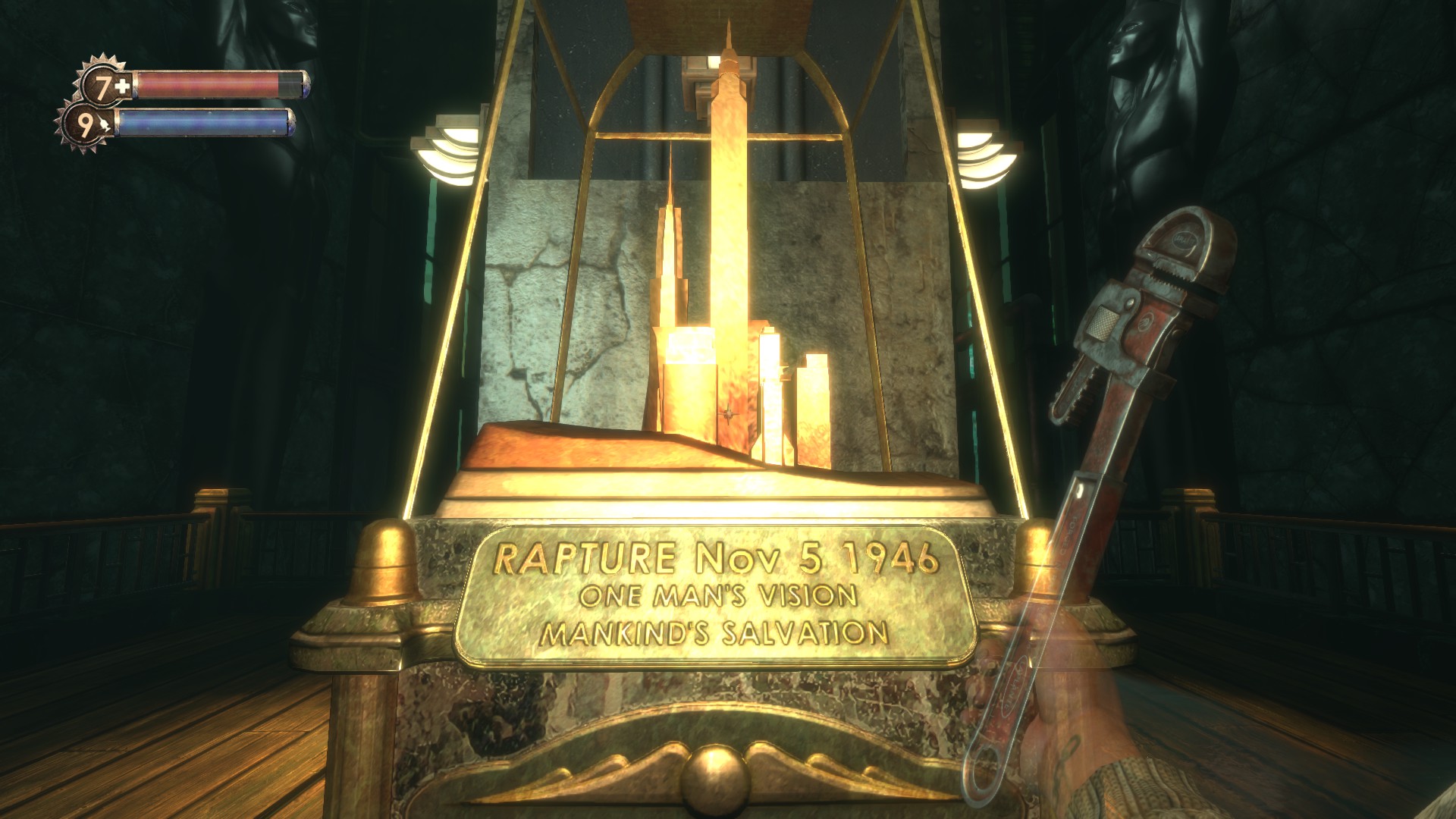
This represents Andrew Ryan’s original view of Rapture.
Andrew Ryan is an anomaly. In many ways he is a caricature of Ayn Rand, one that is atypically played for drama instead of comedy. And despite being a caricature, he also isn’t a straw man. He possesses noble features, and at the same time holds less noble ones that lead to his downfall. Our introduction to Andrew Ryan, for example, is in a monumental statue holding a red banner saying “No gods or kings, only man.” And that message comes through loud and clear in his rhetoric. However, what he says in the banner is overshadowed by the enormous, seemingly golden bust of himself that holds the banner.
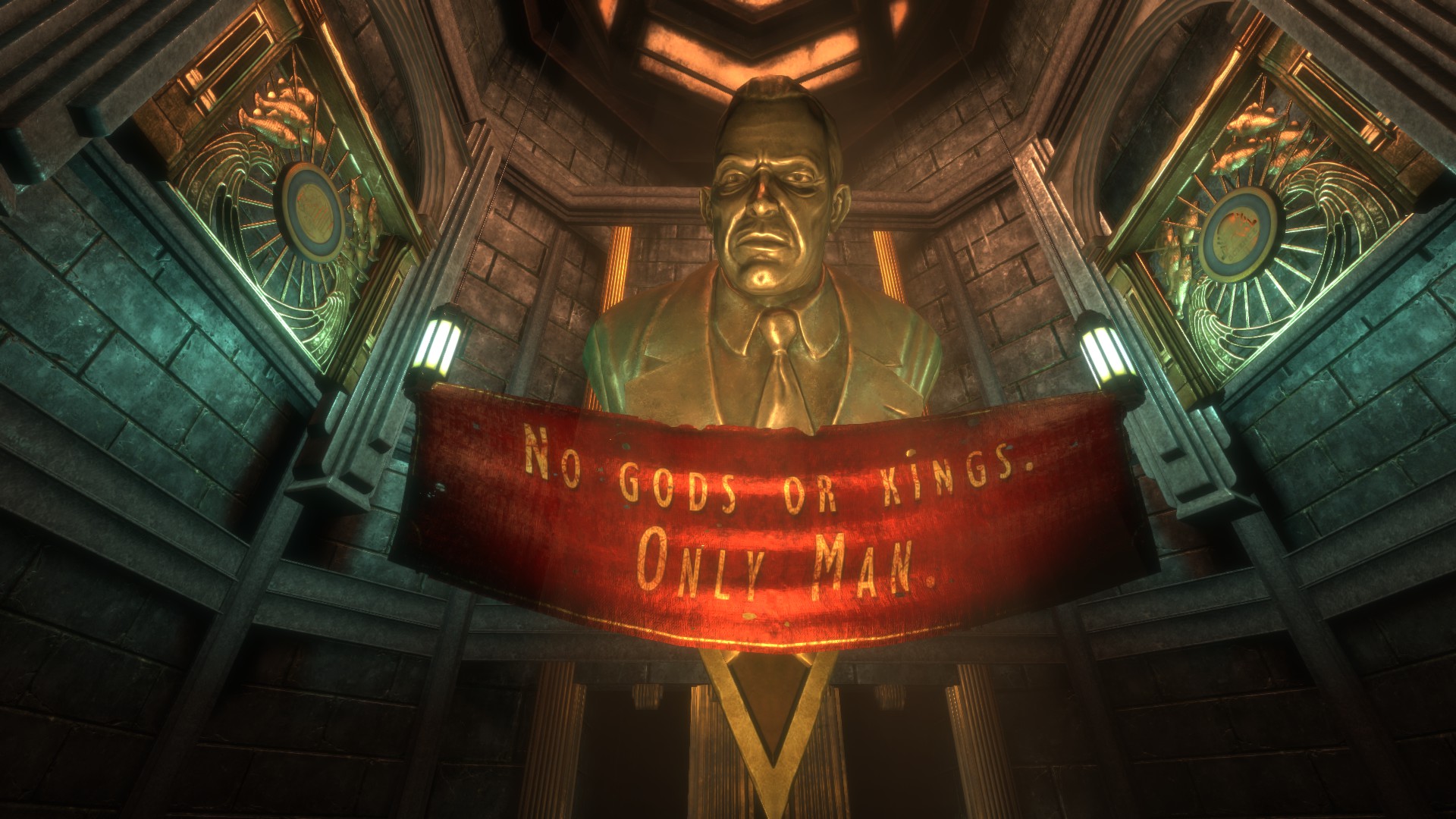
Here we see a microcosm of what I see as the tragedy of Andrew Ryan’s character. His ego won over the mighty ideals that led him to create Rapture, a miraculous city under the sea, and led in turn to both the fall of Rapture and his own ruin. He made something truly unlike anything else on this Earth, and this alone was not enough for him. He could not abide simply being the creator of this magnum opus, his ego demanded he be its king as well.
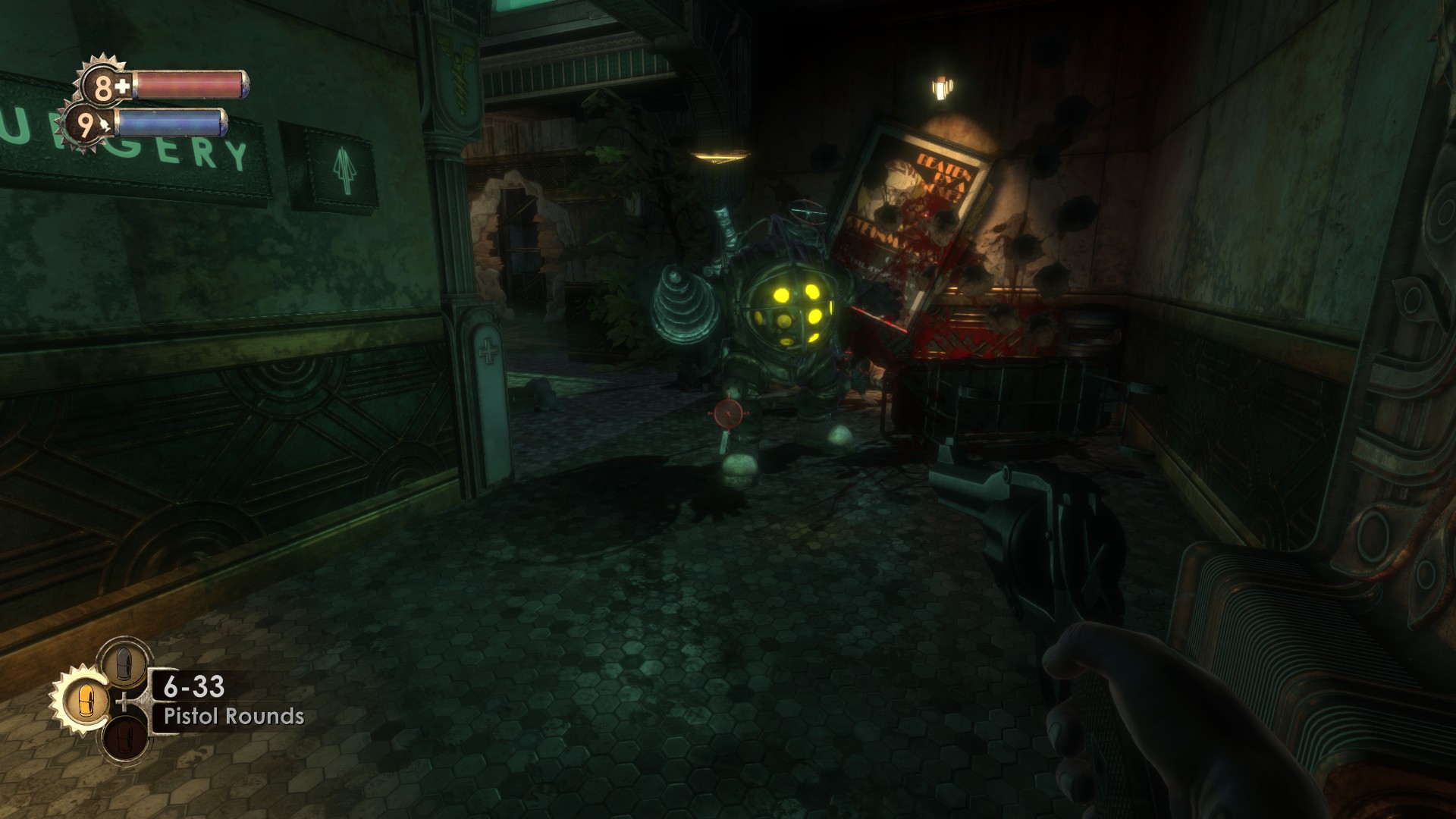
Big Daddies guard Little Sisters, always bringing a tough fight before you can get a hold of any Adam.
While Rapture is full of scientific wonders, the ones most critical to Bioshock are plasmids, as well as the two organic substances Adam and Eve. The discovery of Adam was a miracle of blind luck rather than science. A lowly worker in Rapture with a permanently paralyzed hand was bitten by a strange sea slug on that same hand. Miraculously, he later regained the ability to move that hand. The sea slug secreted a substance of pure stem cells called Adam. But the amount of Adam created by these slugs was quite tiny, and a way to mass produce it was discovered in the form of “little sisters”, little girls turned into living Adam factories. This sounds grisly, and it is, but the value of Adam to science was too tempting to resist. (Remember Rapture is full of objectivist mad scientist types with no oversight or morals.)
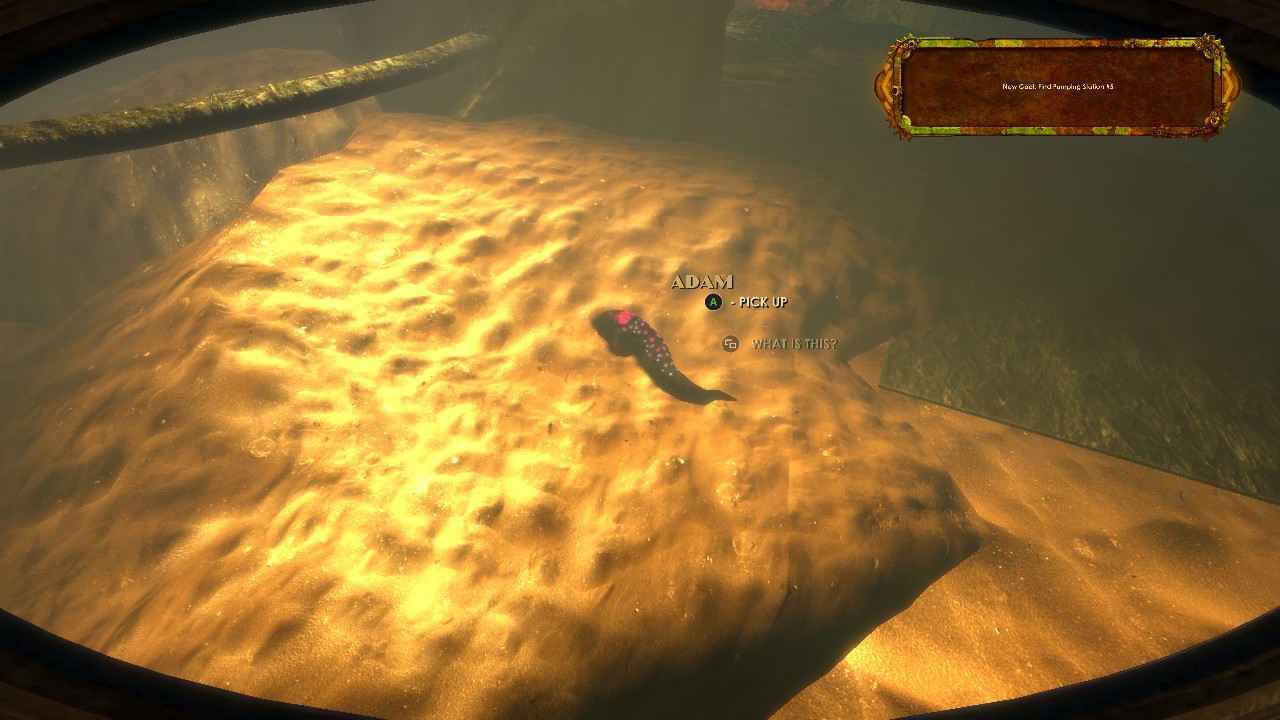
This little guy made splicing possible.
And so from Adam was created the plasmid. Compounds that could be combined with Adam to create inhuman abilities or otherwise alter the biology of a person. The more impressive of which require a secondary substance derived from Adam called Eve, which acts as a kind of energy reserve for fueling the powers granted by plasmids. These inventions, they didn’t lead to happy outcomes. In fact they precipitated a sort of genetic arms race and… well, look at the screenshots.

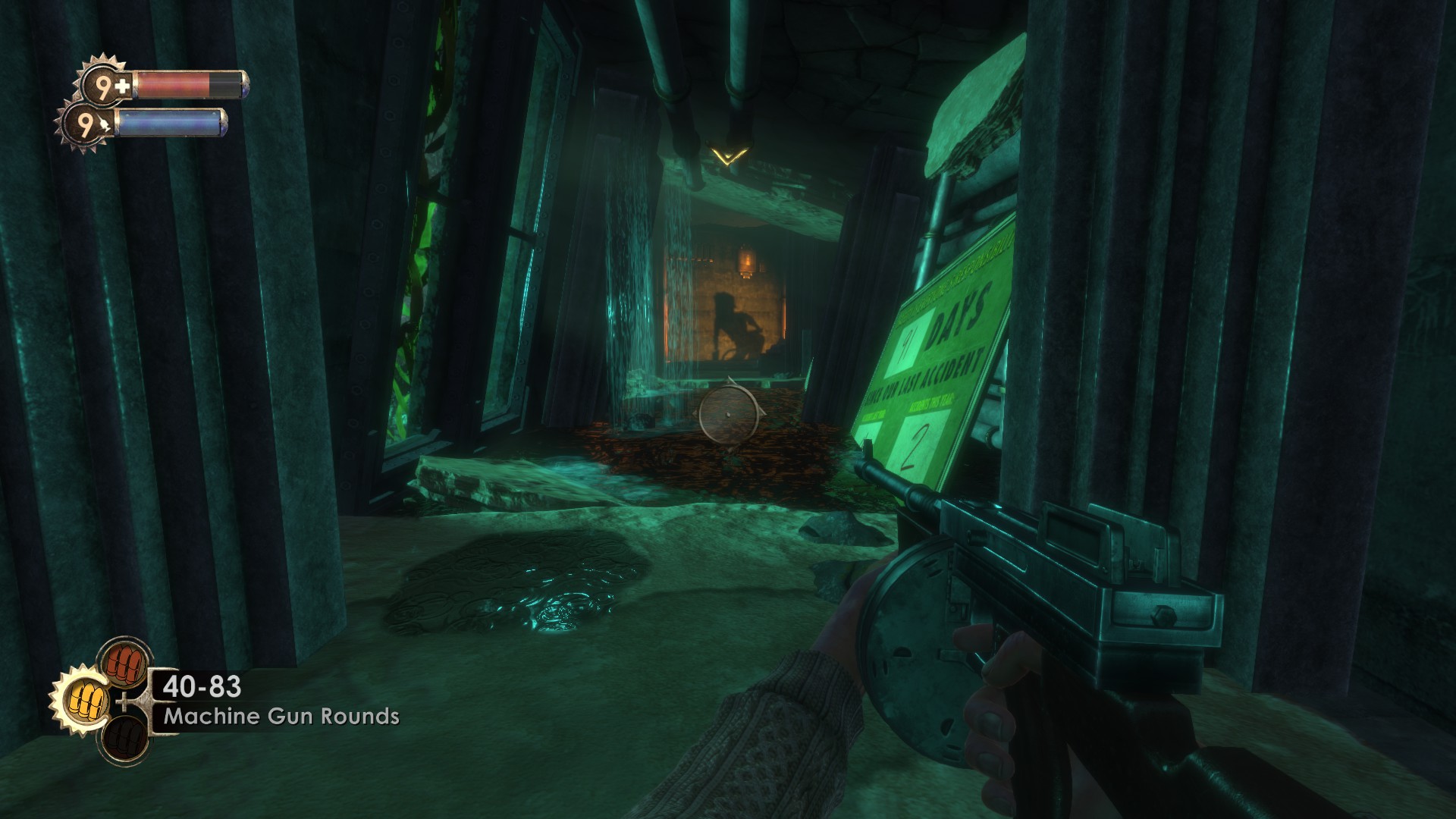
While not a horror game, BioShock often gives horror vibes.
The great amount of Adam held by little sisters made them very tempting targets for desperate types looking to score some Adam for themselves, which quickly became the new default currency of Rapture as its citizens grew addicted to the substance. This required escorts, powerful guardians for the little sisters called “big daddies”, which were heavily altered humans engineered for the purposes of building Rapture initially and more recently to act as escorts for the little sisters to prevent them from being harvested for their Adam, killing the little sister in the process. Players have the moral option of harvesting or rescuing little sisters in gameplay and I admit I will judge you harshly for choosing to harvest them for extra Adam.

The narrative element of Adam doubles as a feature of gameplay. Adam is the currency used at a type of vending machine called a “Gatherer’s Garden”, and from them you can buy plasmids and tonics to upgrade your character.
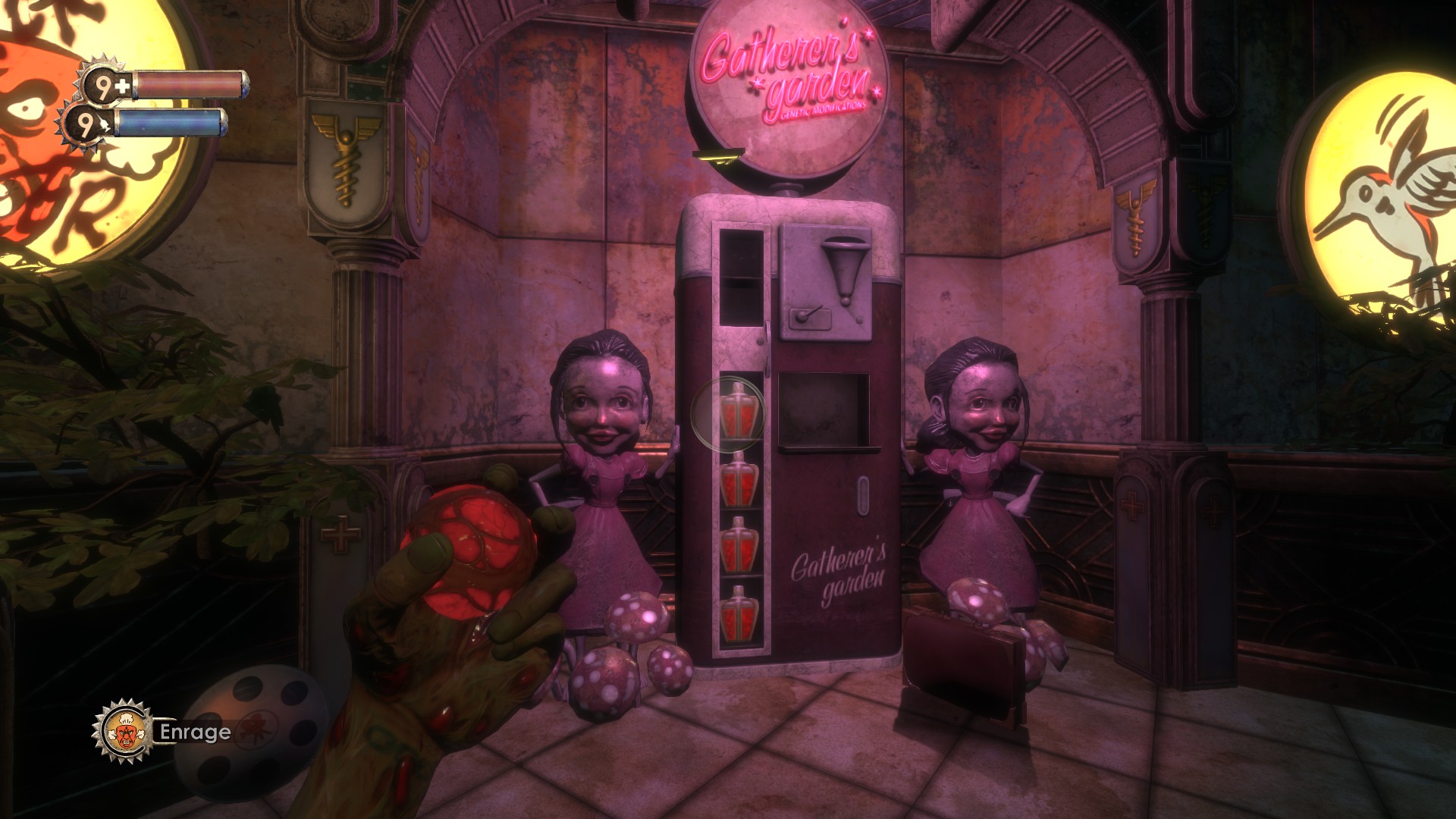
Players can hack turrets and cameras to serve them, as well as to open safes full of goodies. Areas with water can be electrocuted to quickly and easily kill enemies. Enemies can be enraged and made to attack each other. The game is highly systemic in that whatever you do affects the world and may benefit or harm you. With a bit of practice, you can hack almost any machine into doing what you want it to do. Especially cameras as they will summon security bots that will quickly mop up enemies, or wipe the floor with you if you’re not careful.
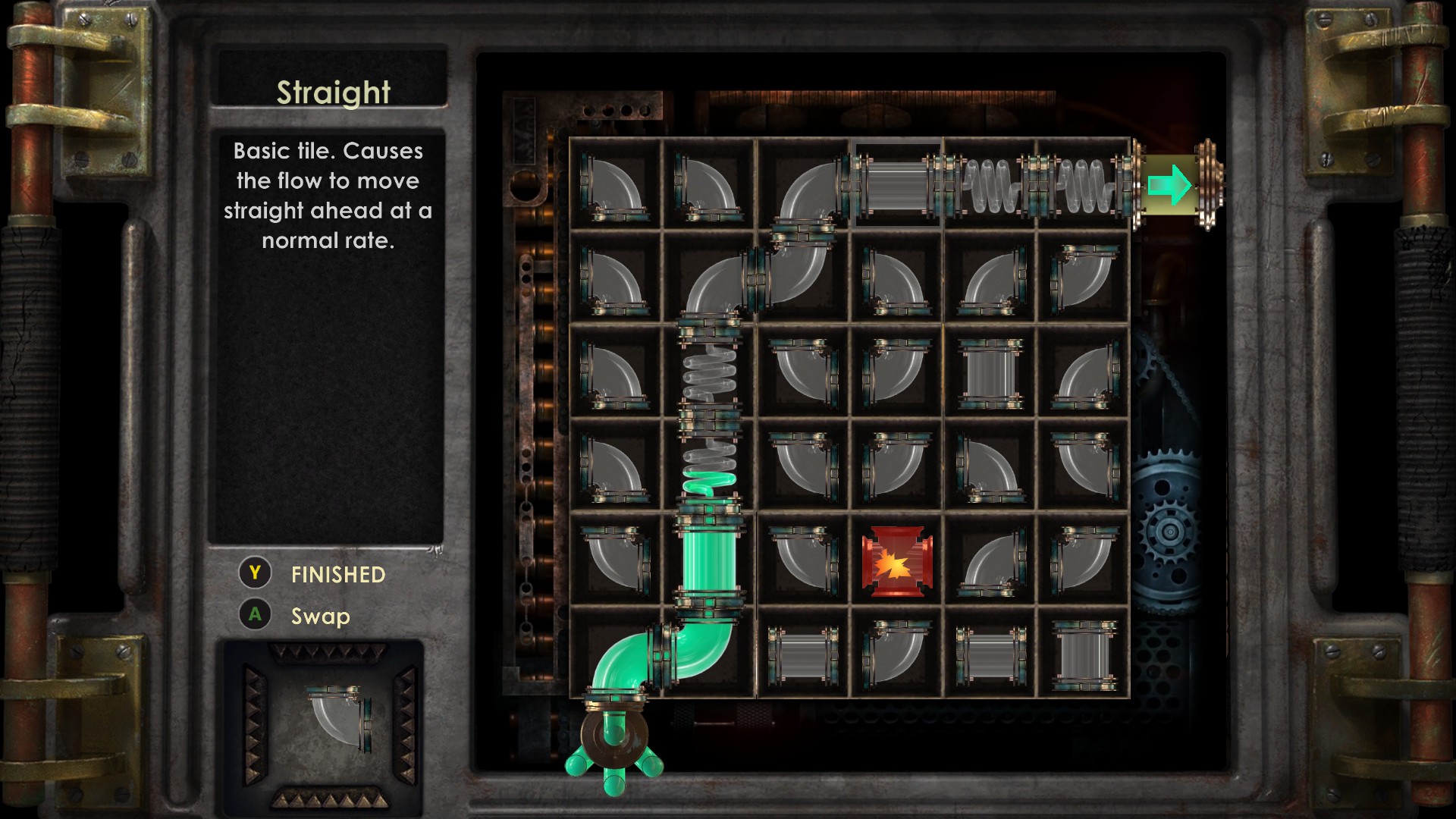
Players can hack devices with this minigame, hacking works much differently in BioShock 2 and is totally absent in BioShock Infinite.
The player has infinite lives, which was an oddity/criticism when Bioshock released. It also has a lore friendly explanation in the Vita Chambers scattered throughout Rapture. Everything in Rapture was clearly well thought out and well planned by the developers, as it feels like it could have been a real place at times. Despite it mostly being in ruins by the start of the game.
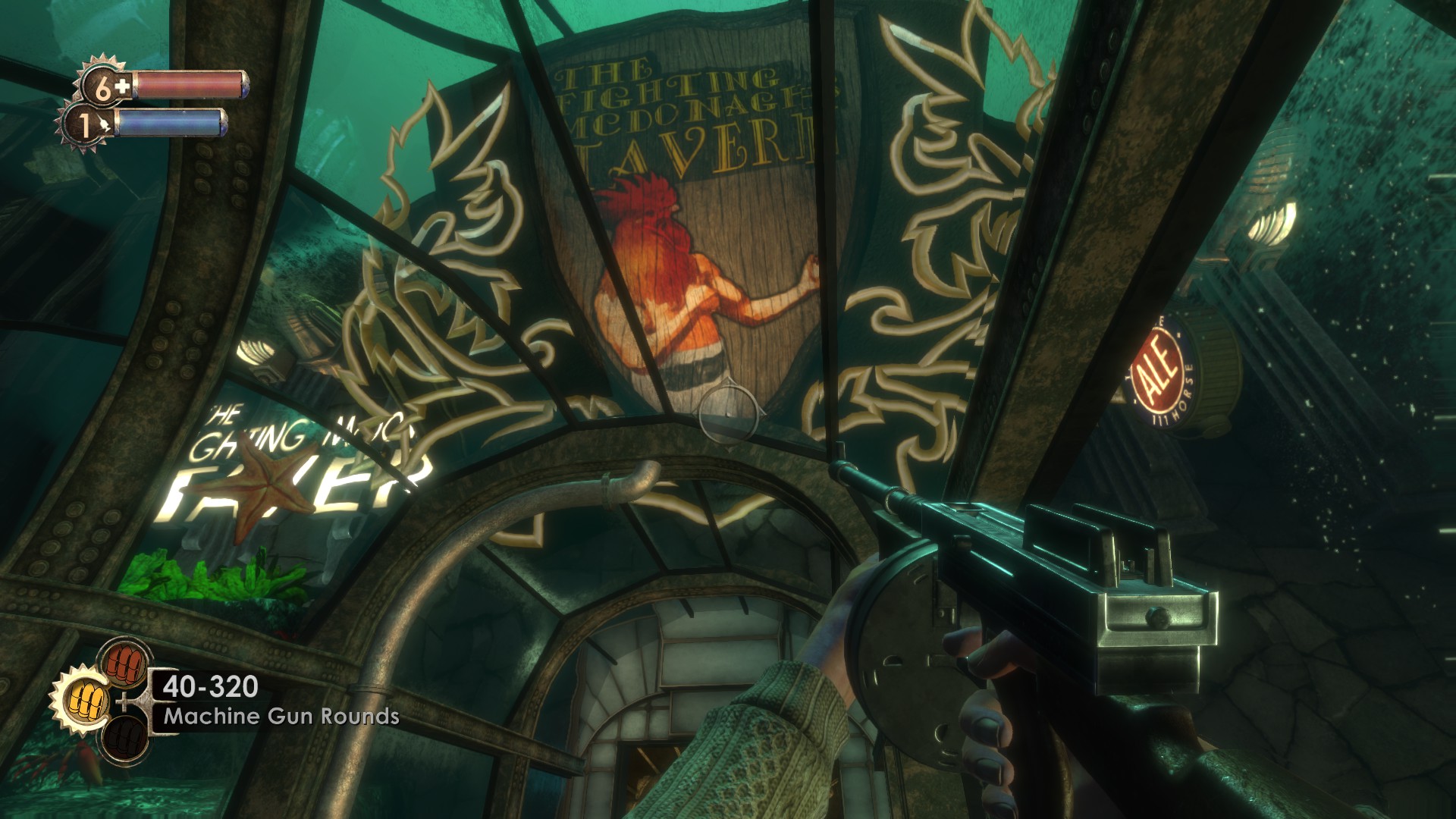
Despite those we see being generally unhinged lunatics, Rapture was once a city full of bright minded people looking to earn a living.
All of the weapons you pick up in the game are carried with you at once. And so you always have a tool to defend yourself with, unless you waste bullets at every opportunity of course. This is something of a staple of the series broken only by Infinite, which opted for a 2 weapon limit.
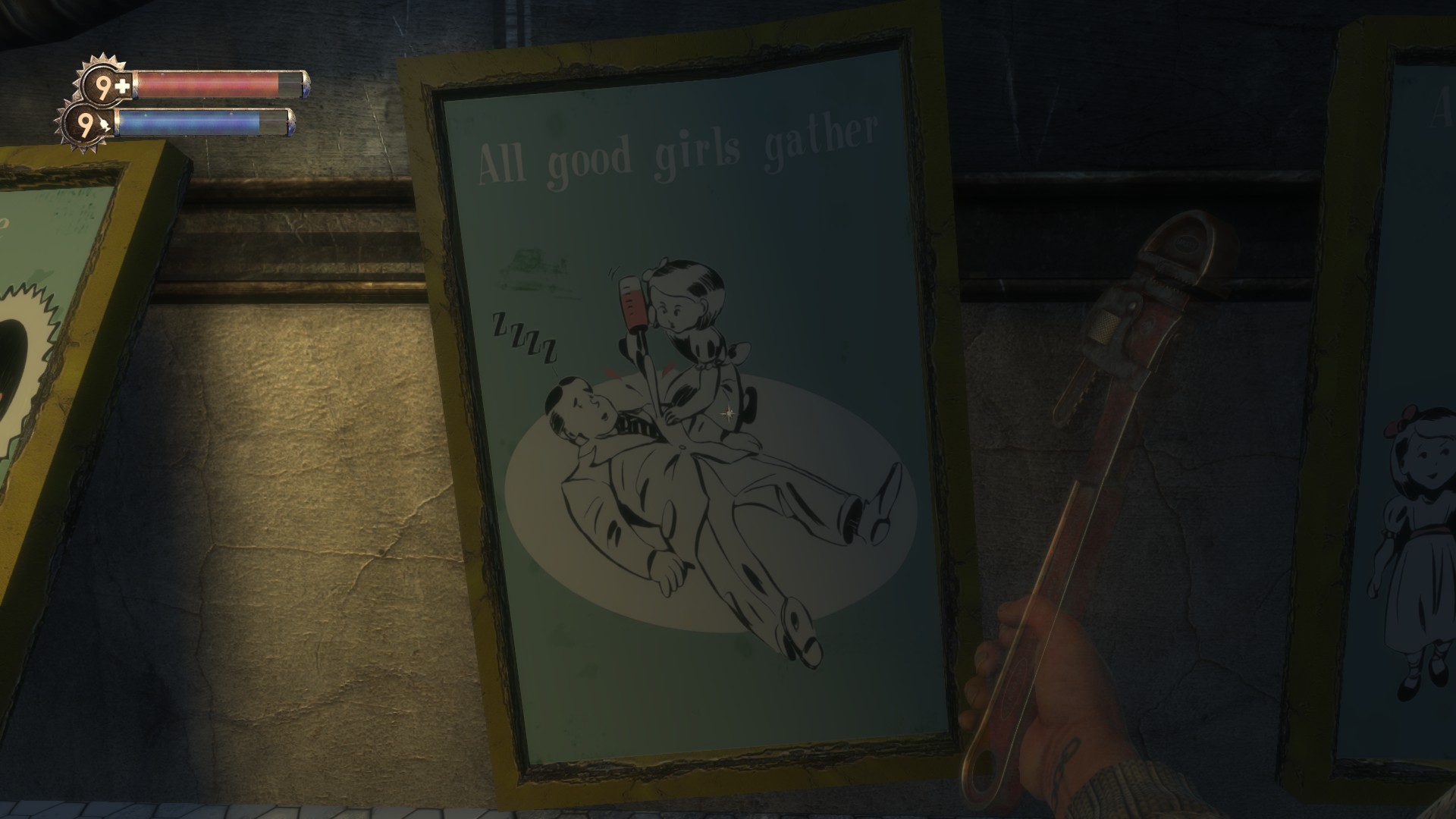
Little sisters are brainwashed into gathering Adam from corpses.
One device a player receives in lieu of a weapon, is a camera. The camera can be used to photograph entities and gain research bonuses from them, costing film each time and giving bonuses only once in a while. A nice addition that I enjoyed but many find tedious.
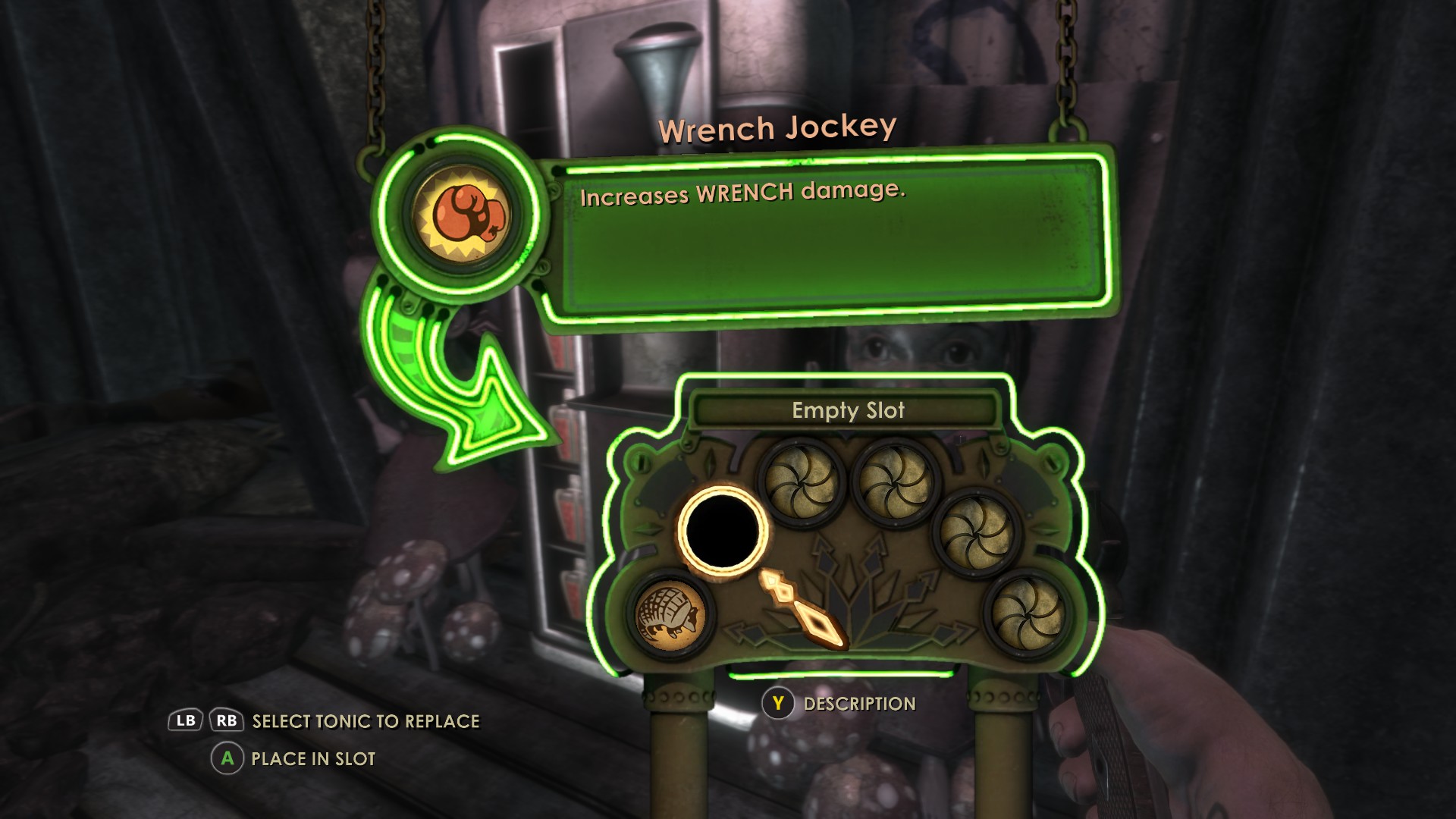
Players may upgrade their character via Gene Tonics.
Once they reach Arcadia, a player can collect components to be combined into items such as ammo at a U-invent station. This feature didn’t return for any sequels and I’m not especially fond of it myself, though you do have to use this system at least once to progress the story.
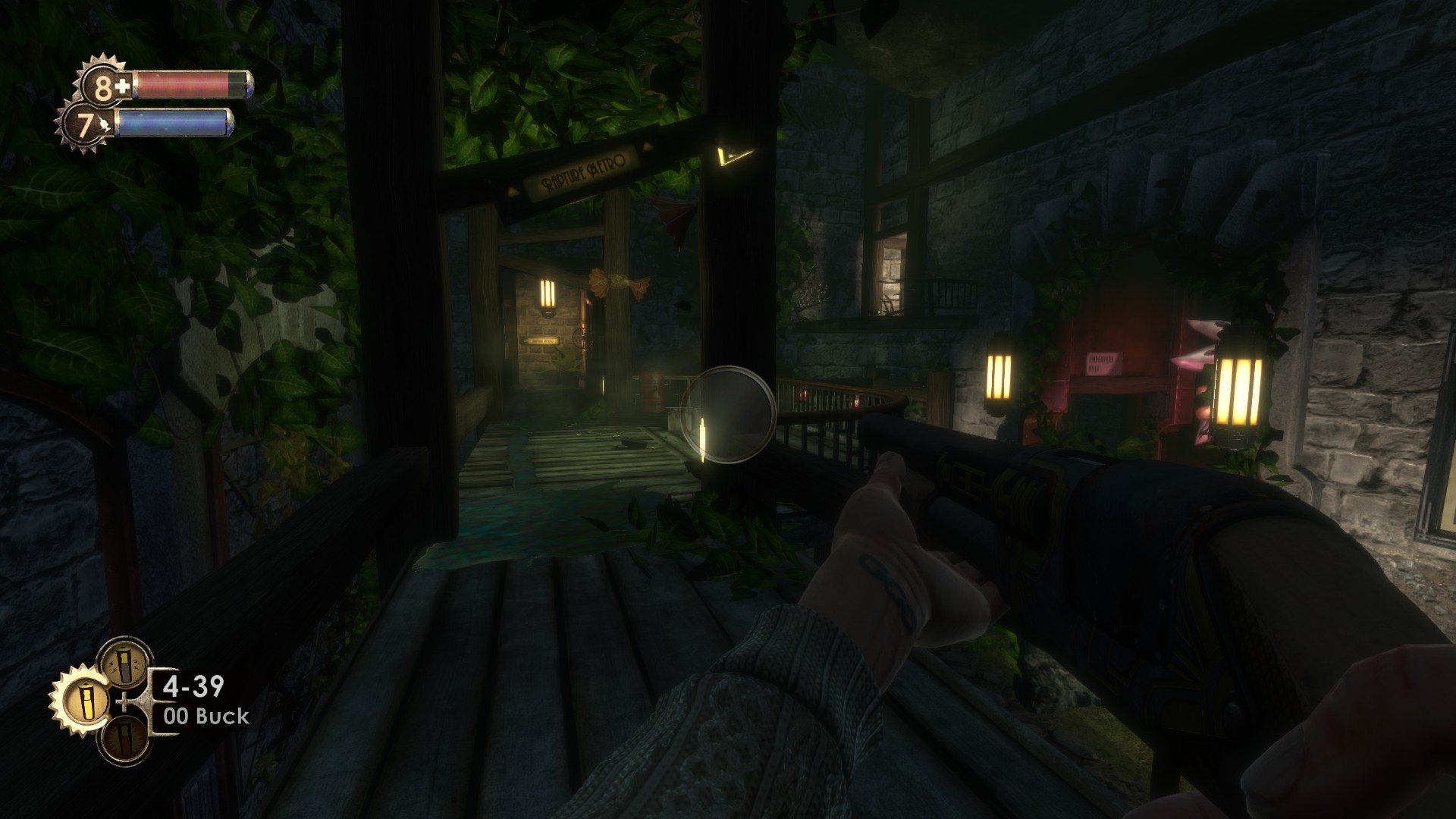
Arcadia is something of an underwater forest.
I want to express that normally I play games on the highest difficulty setting, as I did when I originally played Bioshock years ago. But this time around, for whatever reason I never found my footing as well as I usually do. So I set the difficulty for Medium and that was a comfortable balance for me. Stupid deteriorated skills.
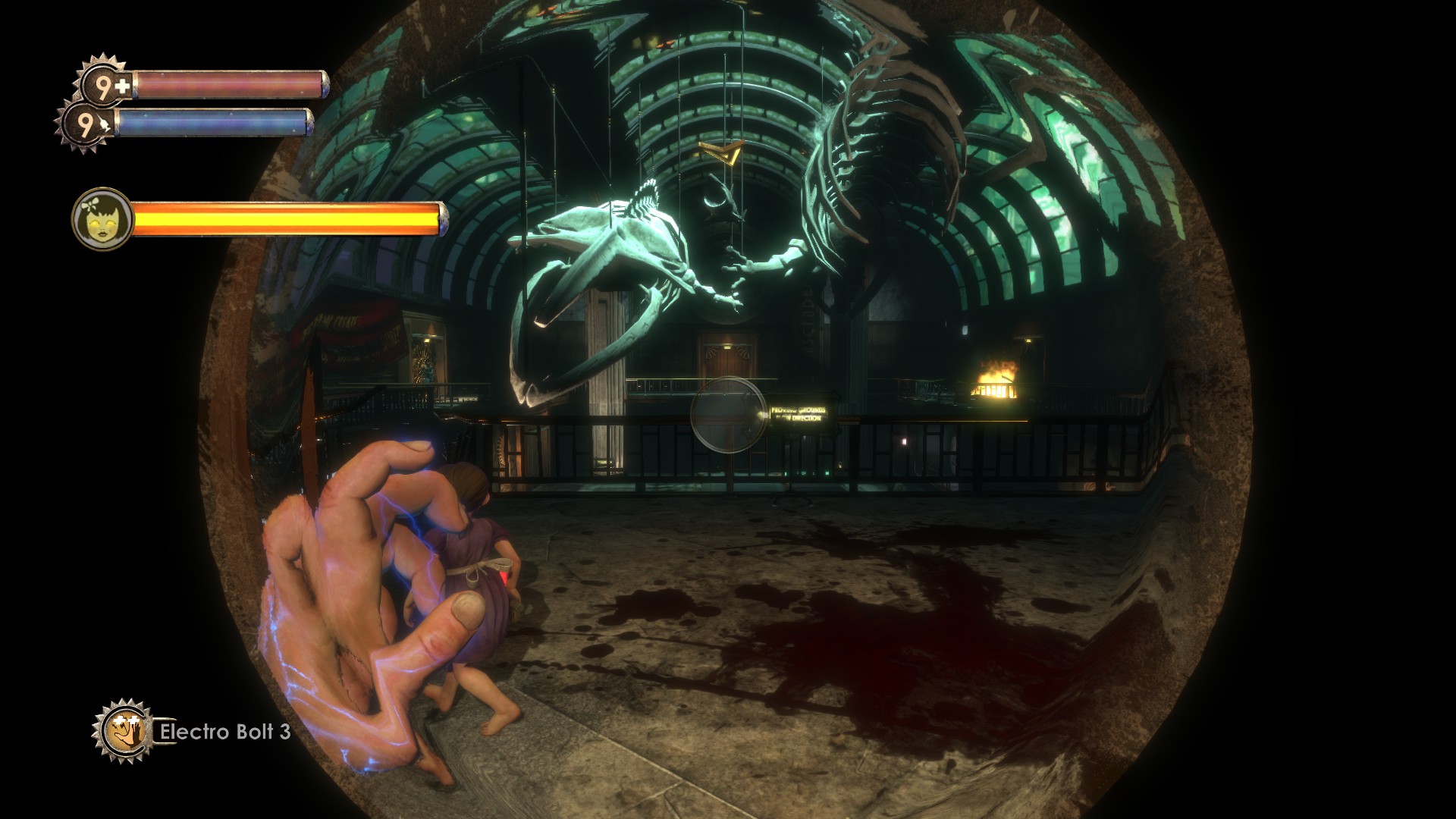
While BioShock has a player dress up as a Big Daddy, 2 has the player play as one proper.
Apart from Andrew Ryan, Bioshock is blessed with a number of memorable characters. Such as the heroic Atlas, the slimy Frank Fontaine, Brigid Tenenbaum, Dr Suchong, and the mad artist Sander Cohen. All of whom play important roles in selling the story of the doomed city of Rapture. Most of the characters integral to the story are in fact posthumous, leaving logs that when collected weave a tragic narrative of Ryan’s great ambitions pulling him and all that knew him towards oblivion. I won’t spell out the ending, but everybody dies except for Tenenbaum, her carrying a vital role in the sequel.
Bioshock 2

Many folk dislike Bioshock 2 and dismiss it out of hand in discussions of the best game in the series. I cannot express how sad this makes me, as Bioshock 2 is actually my favorite game of the series, followed closely by Infinite. There are little touches that I feel improve greatly on the original game such as improved controls and better game balance. Things like limiting a player’s supply of medkits and Eve syringes to a maximum of 5 rather than the original limit of 9. I also love the way the player moves differently from the first game, feeling the heft of being one of the iconic big daddies. It also managed to improve on combat, battles feel much more fluid than before with plasmids becoming much more useful.
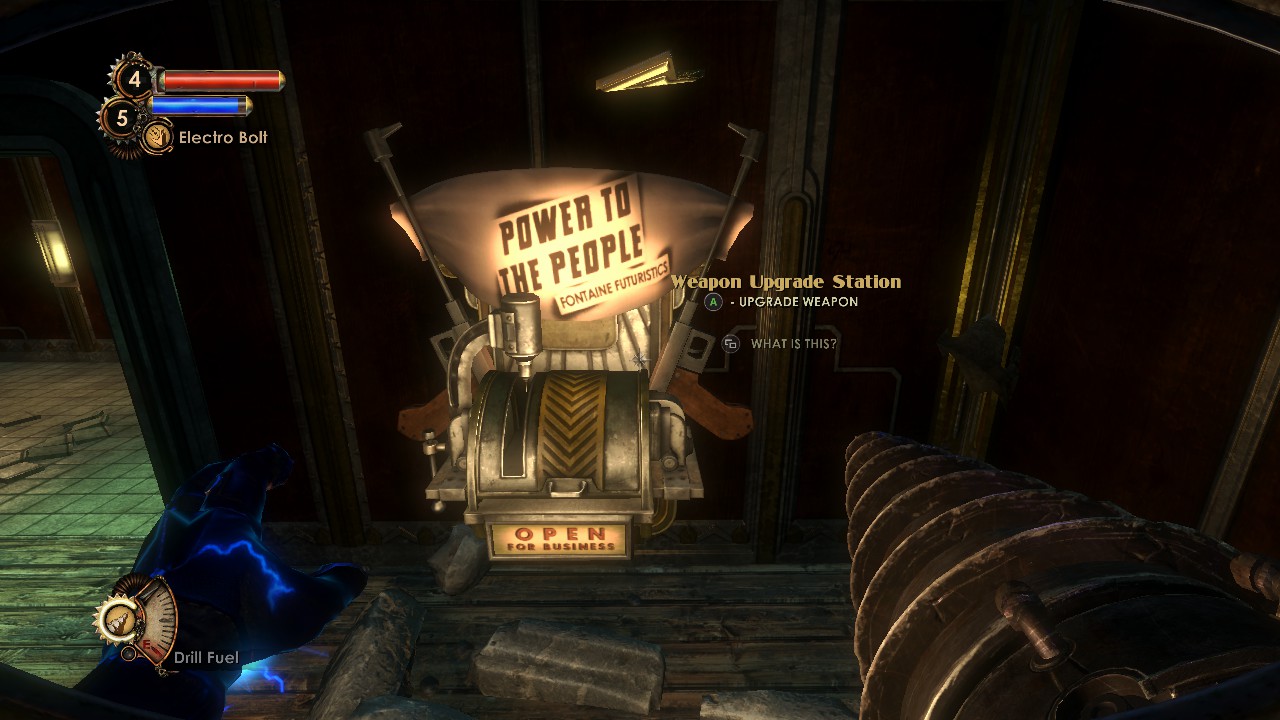
Remnants of the first BioShock are everywhere, such as in these weapon upgrade stations from Fontaine Futuristics.
Bioshock 2 takes place some years after Bioshock’s good ending. With Andrew Ryan and Frank Fontaine both dead. Rapture has been revived in recent years however by a sort of psychiatrist turned cult leader named Sophia Lamb. With collectivist ideals, she is leading Rapture’s (often horribly spliced) citizens to a new future. The player character for this game is Subject Delta, a big daddy mysteriously resurrected at a Vita Chamber. He receives psychic messages from a girl calling him her father, her name is revealed to be Eleanor Lamb, daughter of Sophia Lamb.

BioShock 2 has you play as Subject Delta, a prototype Big Daddy.
A little sister you meet early on tells you Eleanor misses you, shortly before being abducted by a creature called a big sister. You soon meet up with Brigid Tenenbaum from the first game, as well as with a new and quite shifty fellow named Sinclair. Sinclair acts as your support and I must say he’s very likable.
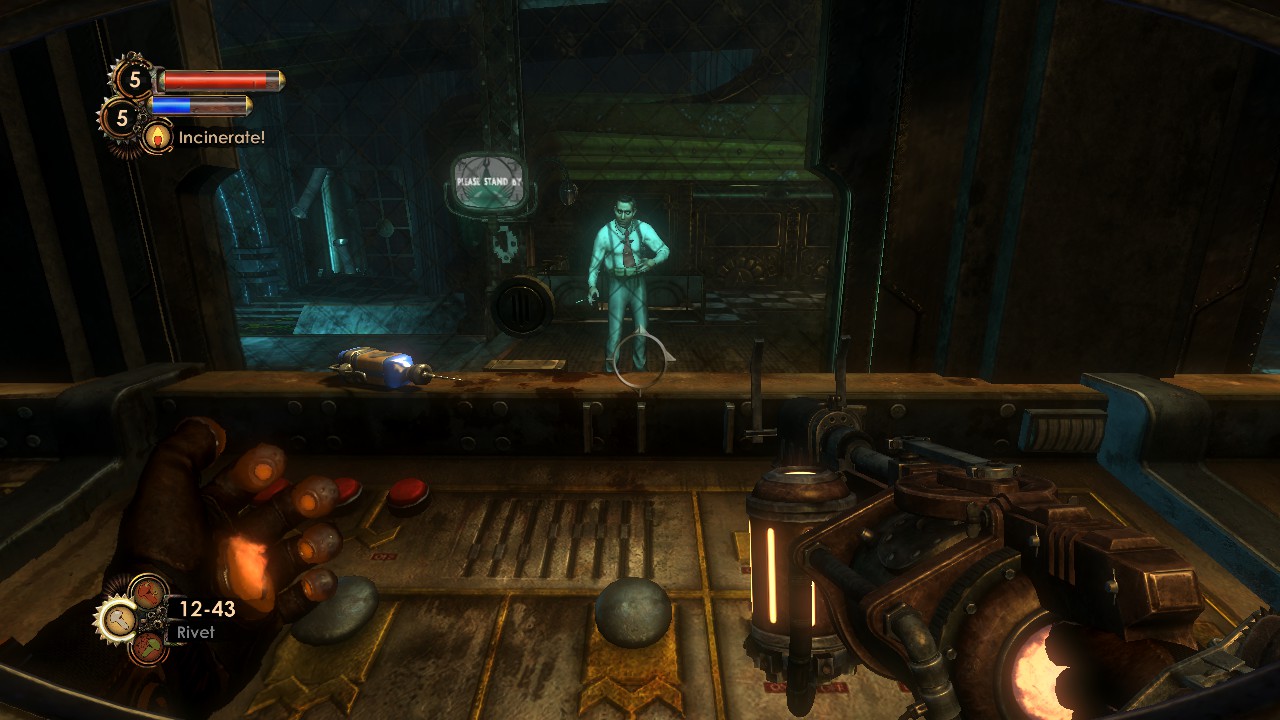
What ensues is a strange and emotional journey of a sort of father seeking to reunite with his daughter. It’s a very sincere, even sentimental story relatively lacking in twists compared to Bioshock or Infinite. While the other 2 Bioshock games delight in the old bait and switch, Bioshock 2’s story gives the player exactly what it promises. And its ending, while Bioshock had what I consider a rather floppy endgame compared to the rest of itself, Bioshock 2’s endgame feels rewarding and empowering.
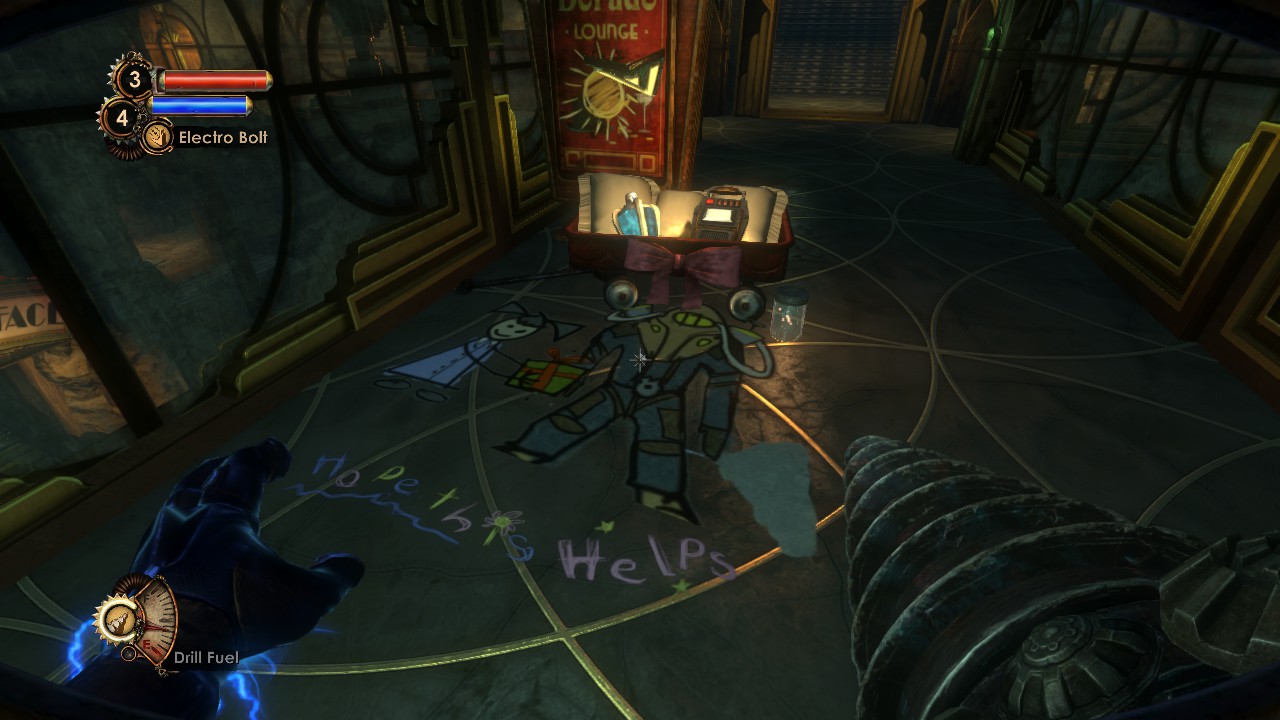
You periodically find gifts left for you by Eleanor via the Little Sisters.
From a story perspective, Bioshock 2 was a very personal experience when I first played it. During the middle of my divorce, it was a thing I could sink my teeth into instead of my self loathing. The story has a number of choices that, while I think most players will choose exclusively the “Good” options, the fact of a choice makes the moments more impactful anyway.
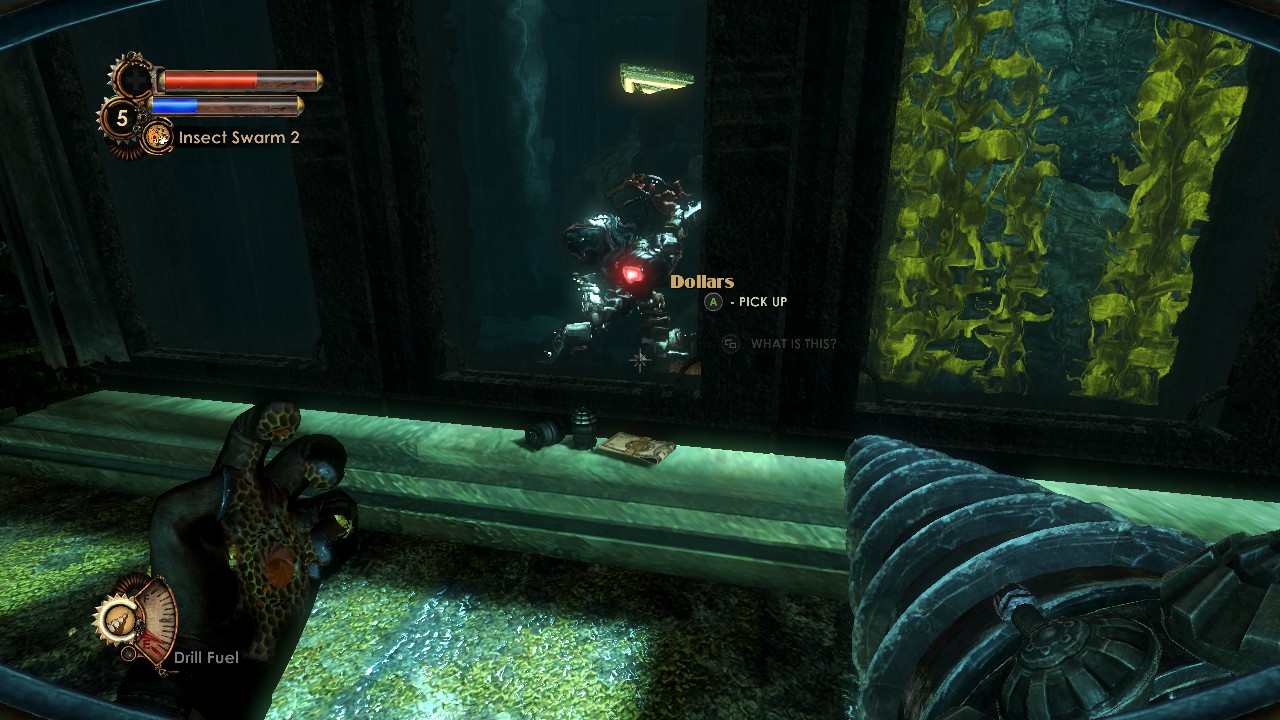
BioShock 2 answers the question “What if Little Sisters grew up?”
In Bioshock 2, there are many reminders of the past. Many remnants of Andrew Ryan and Frank Fontaine’s war. Ryan Amusements is an early stage on Bioshock 2, filled with animatronics that act out Ryan’s objectivist world view and are made to dissuade kids from ever leaving Rapture. Weapon upgrade stations return, still bearing the Fontaine Futuristics label. Gatherer’s Gardens return as well, all worn down somewhat by years of neglect. Bioshock 2 bears a ubiquitous theme of decay and disrepair to its environments. One especially entertaining moment for me is a musical throwback to Sander Cohen from the first game.
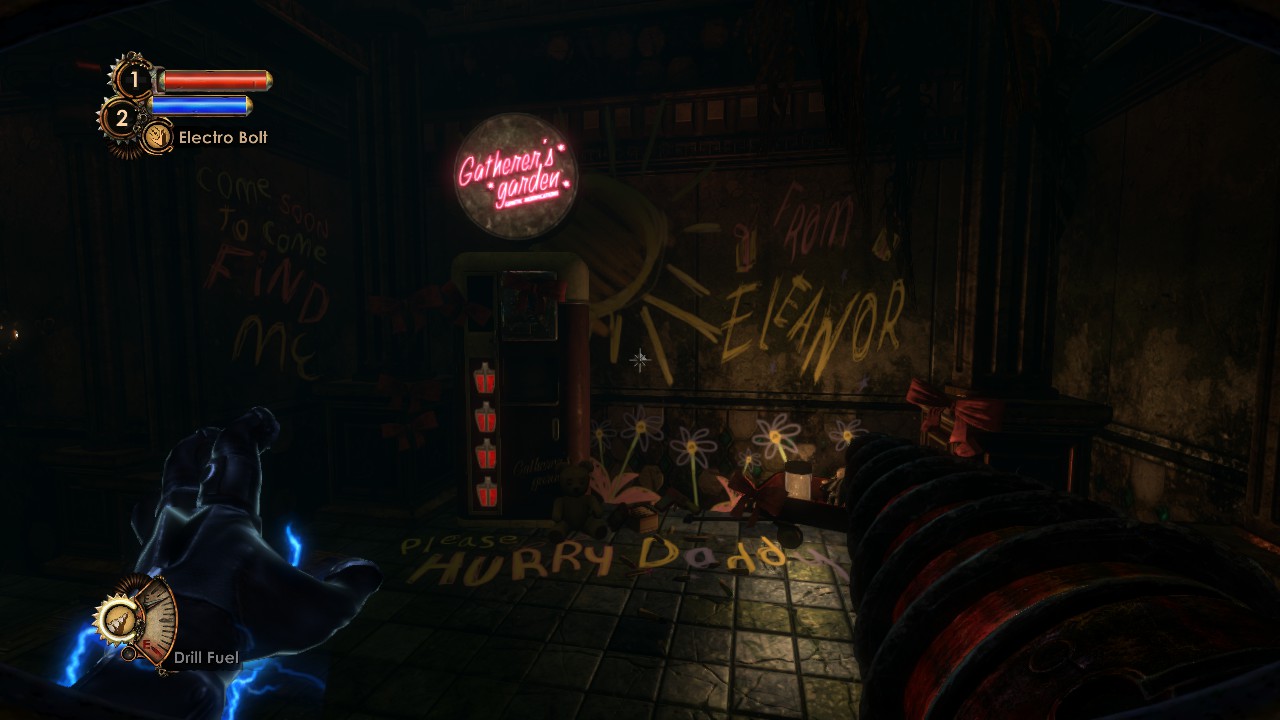
Bioshock 2 varies from Bioshock the most by way of how the player interacts with little sisters. What used to be a binary choice now comes with a few options. Players can still choose to harvest or rescue a little sister, but they also can take them out to gather Adam from corpses. These segments function as horde gameplay with the player fighting off multiple opponents while the little sister gathers. It feels very immersive to the experience of being a big daddy. My only complaint is that there remains the option of harvesting a little sister, which I would argue to be even more unthinkable in this game than in the original Bioshock.
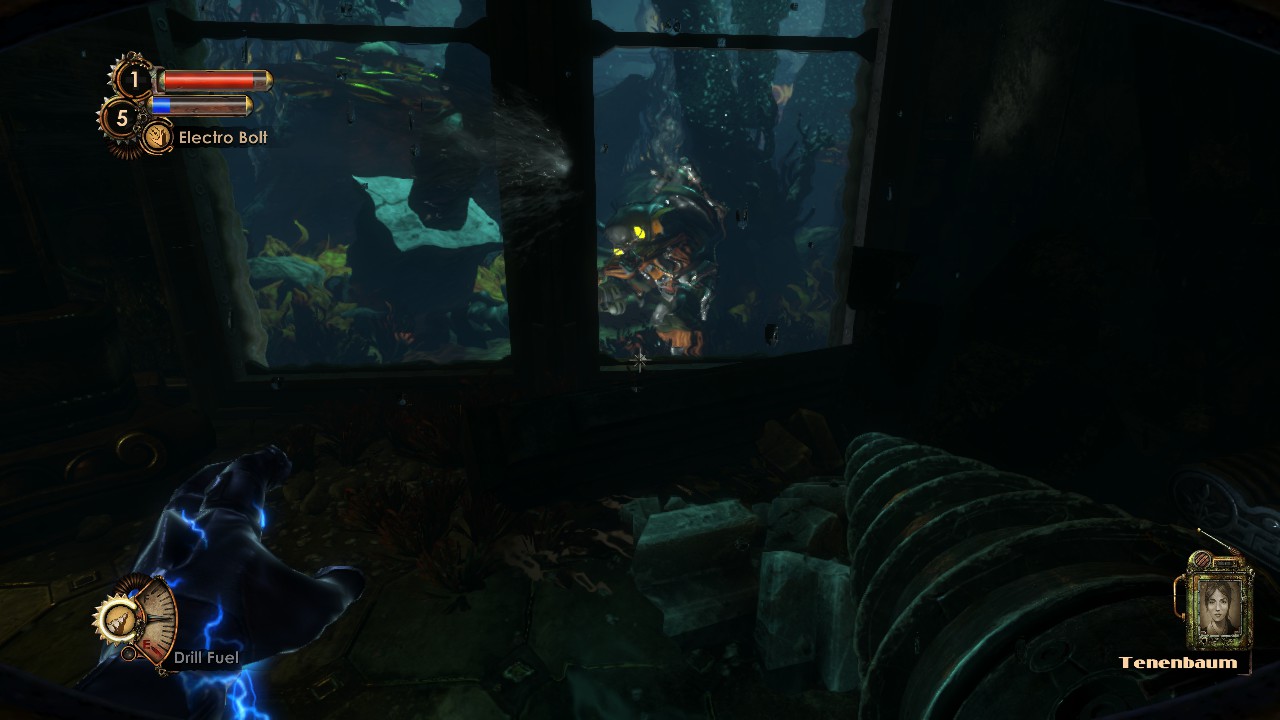
Another way Bioshock 2 makes itself distinct is by simplifying the passive upgrades one collects. This time they are all categorized as gene tonics, and the player simply adds as many as they can carry. These work to drastically change gameplay in some cases. My favorites affect the drill, letting me live out my big daddy fantasies. My favorite is Drill Specialist, which gives you ridiculous EVE efficiency for plasmids while limiting your weapons to the drill. Great for cutting loose with the plasmids. I just wish this game had a New Game Plus for this baby alone.
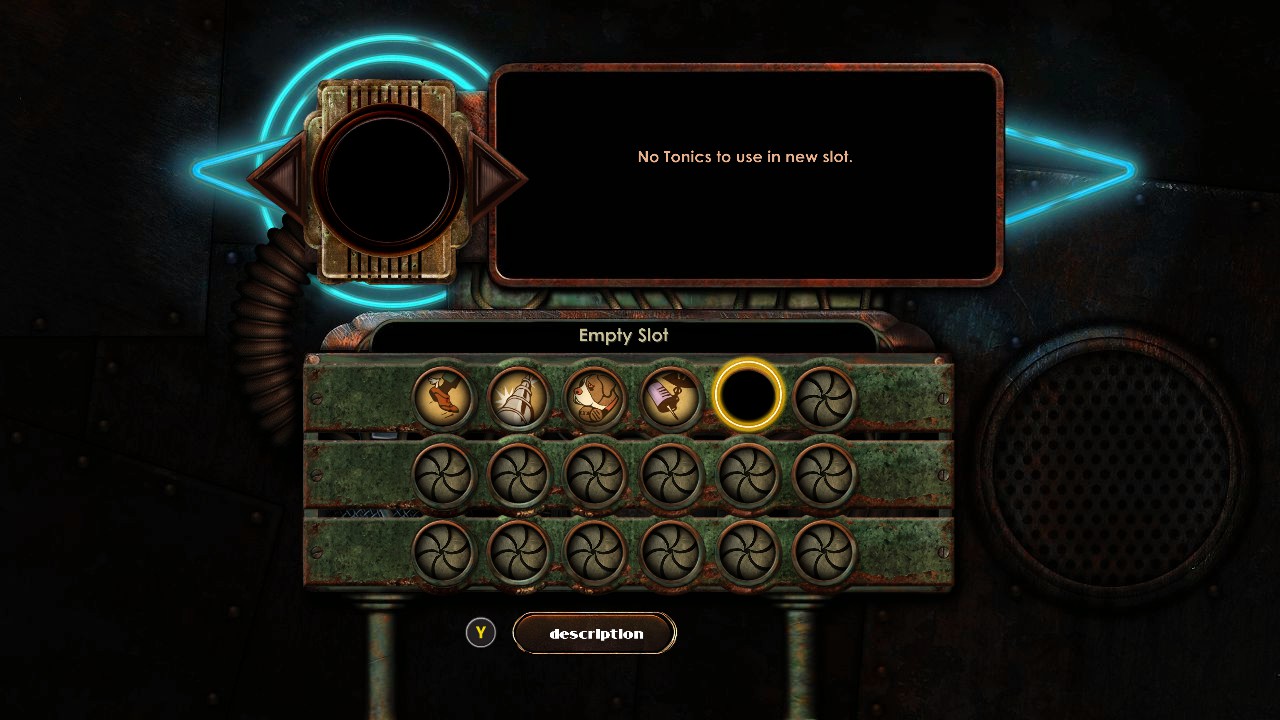
Simpler than ever.
This game’s version of the Camera is improved as well. No longer requiring film. This one works almost like a minigame, encouraging the player to use diverse methods to dispatch enemies.
When playing through levels of Bioshock 2, I can’t shake the feeling of linearity. Probably because it forbids backtracking. Normally I dislike this, but in this game it feels appropriate. I have OCD, and so before I leave an area I always make certain to do everything I want done before leaving anyway. The levels are also less confusing to navigate, probably because the map is easier to read than in Bioshock.
Infinite
Bioshock Infinite is the true oddity of the trilogy in my opinion, largely disconnected from the events of Bioshock and Bioshock 2. The game takes place in a much earlier time period, and has a heavily steampunk aesthetic.
The player character in Infinite is voiced, and has a lot of personality and backstory unlike the blank slates of Jack and Subject Delta before him. Booker Dewitt is a former Pinkerton detective, doing a job for an unknown client that involves taking a strange girl back to New York to wipe away a debt. Problem, the girl, named Elizabeth, is the daughter of a cult leader named Father Comstock. A further problem is that they are both located in a floating city called Columbia. Leading to the same sort of gameplay we see in Bioshock and Bioshock 2 but this time in a drastically different setting.
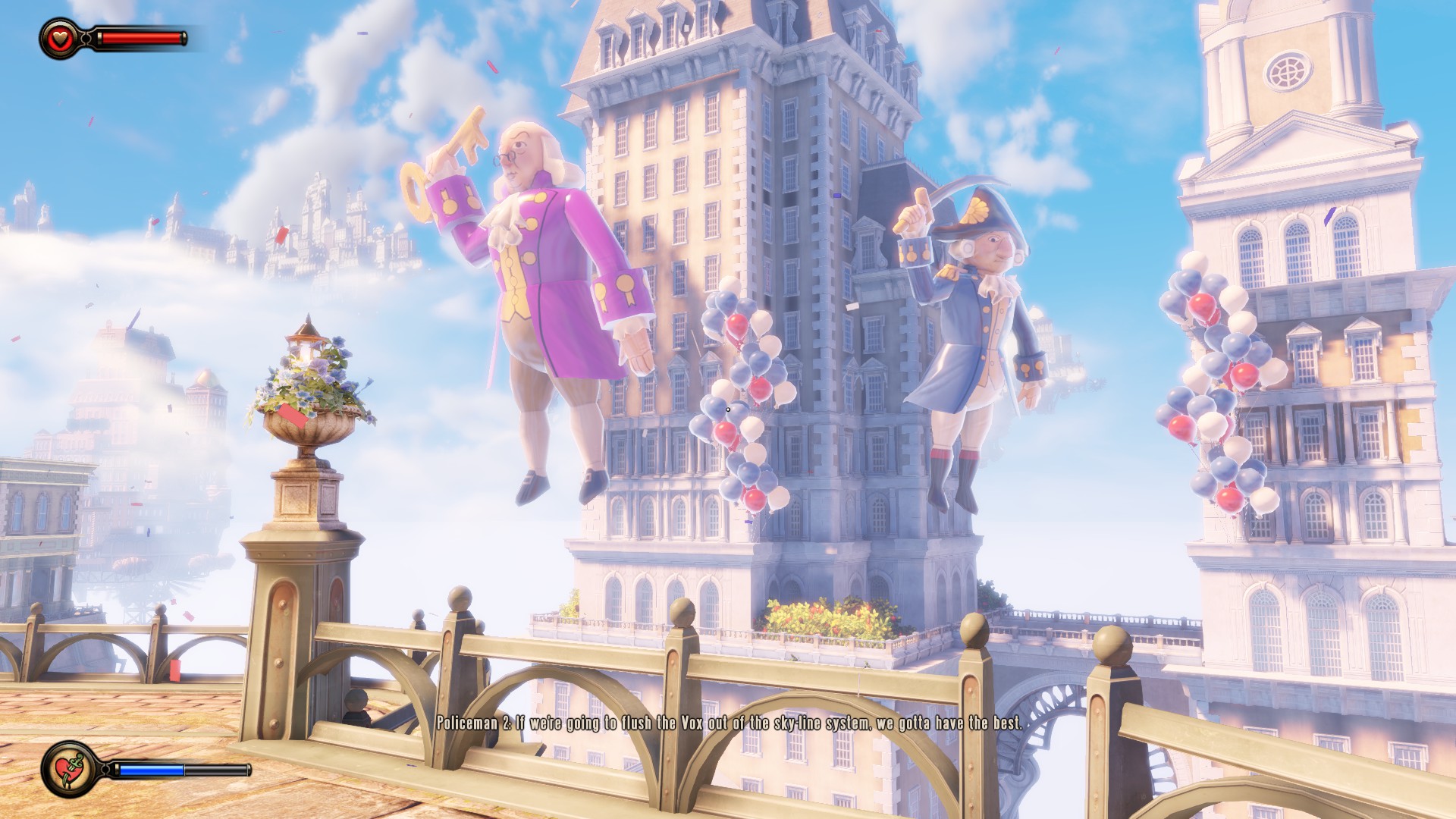
The founding fathers, Washington, Franklin, and Jefferson are treated as the patron saints of Columbia.
Columbia is a very different place from Rapture… initially. Before long the city is falling apart and the ensuing chaos becomes deeply reminiscent of Rapture’s decline. This time due to Columbia’s deeply racist policies and the steep divide between the wealthy and the poor.
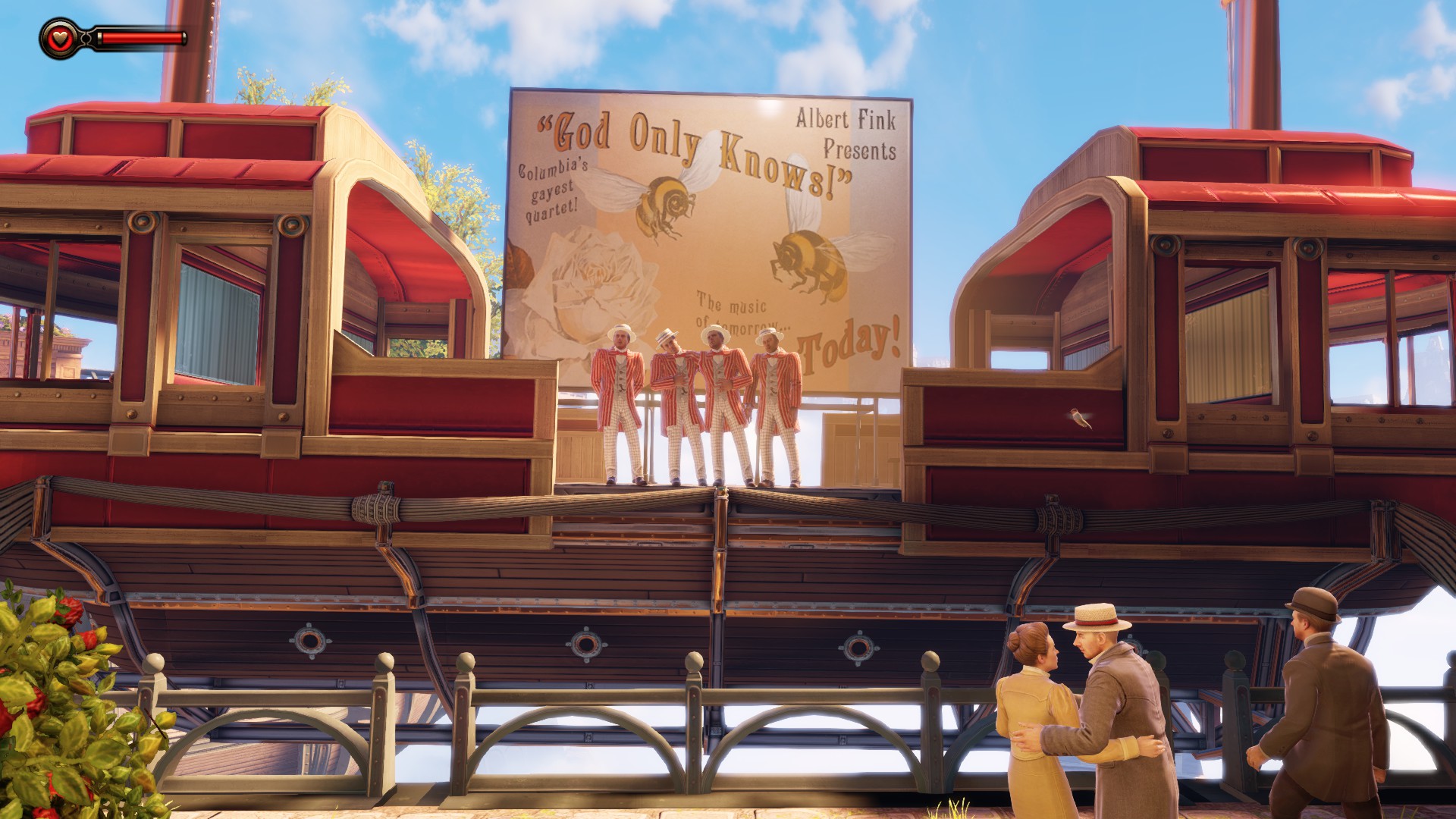
The Beatles, as covered by a Barber Shop Quartet?
Columbia is beautiful. And especially in the early game when everything is pristine, Infinite can feel like a breath of fresh air compared to the confines of Rapture. I personally play through these games in sequence, though often I also alternate between Bioshock 2 and Infinite. There’s always a new way to go about a BioShock game and so replay value is very much a baked in feature. My favorite way to play Infinite however is probably 1999 mode. An extra hard difficulty setting available by either clearing the game on Hard or entering a cheat code. It requires you to spend in game currency for every time you lose a life. I like it for placing a limit on your infinite lives.
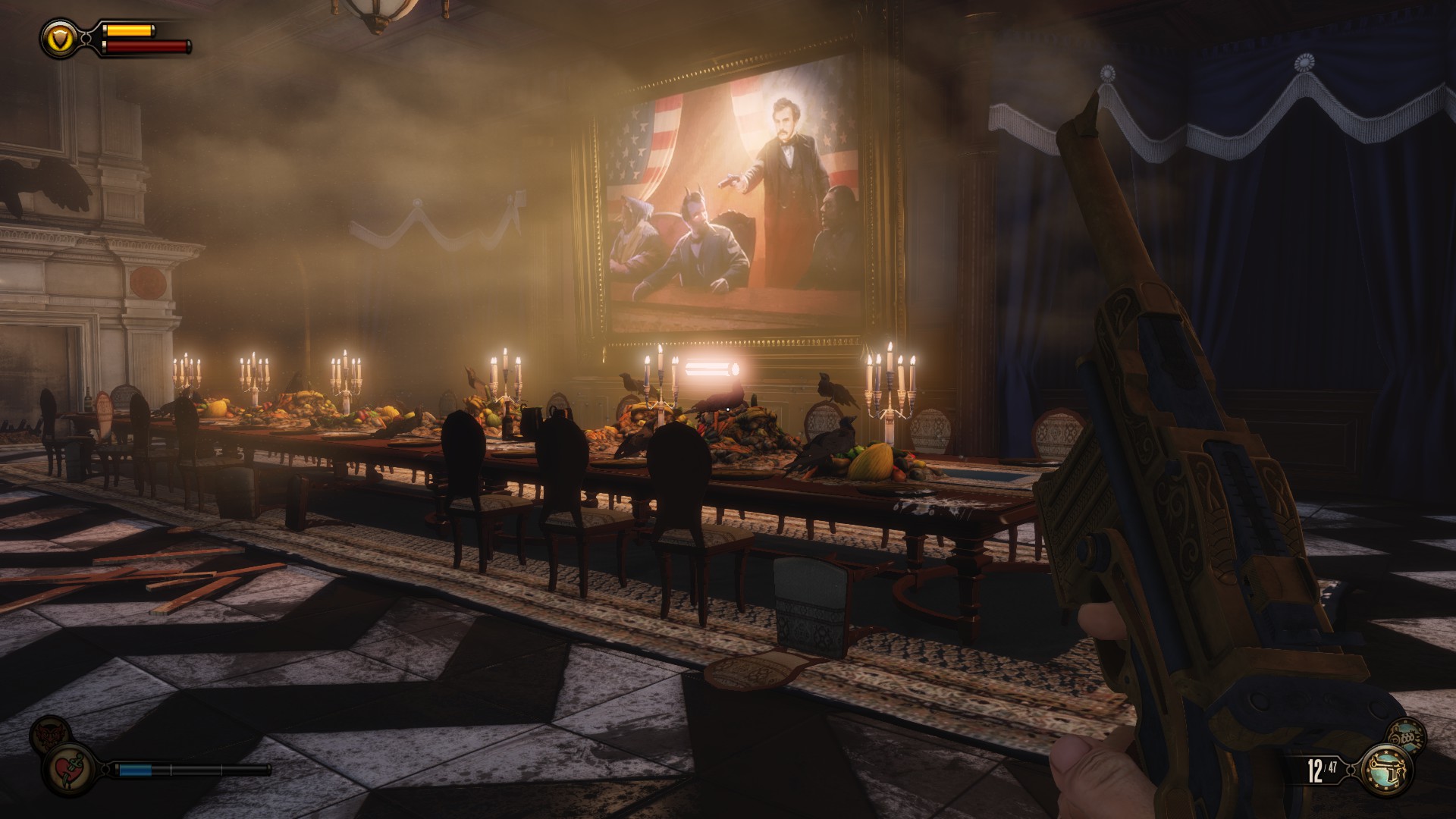
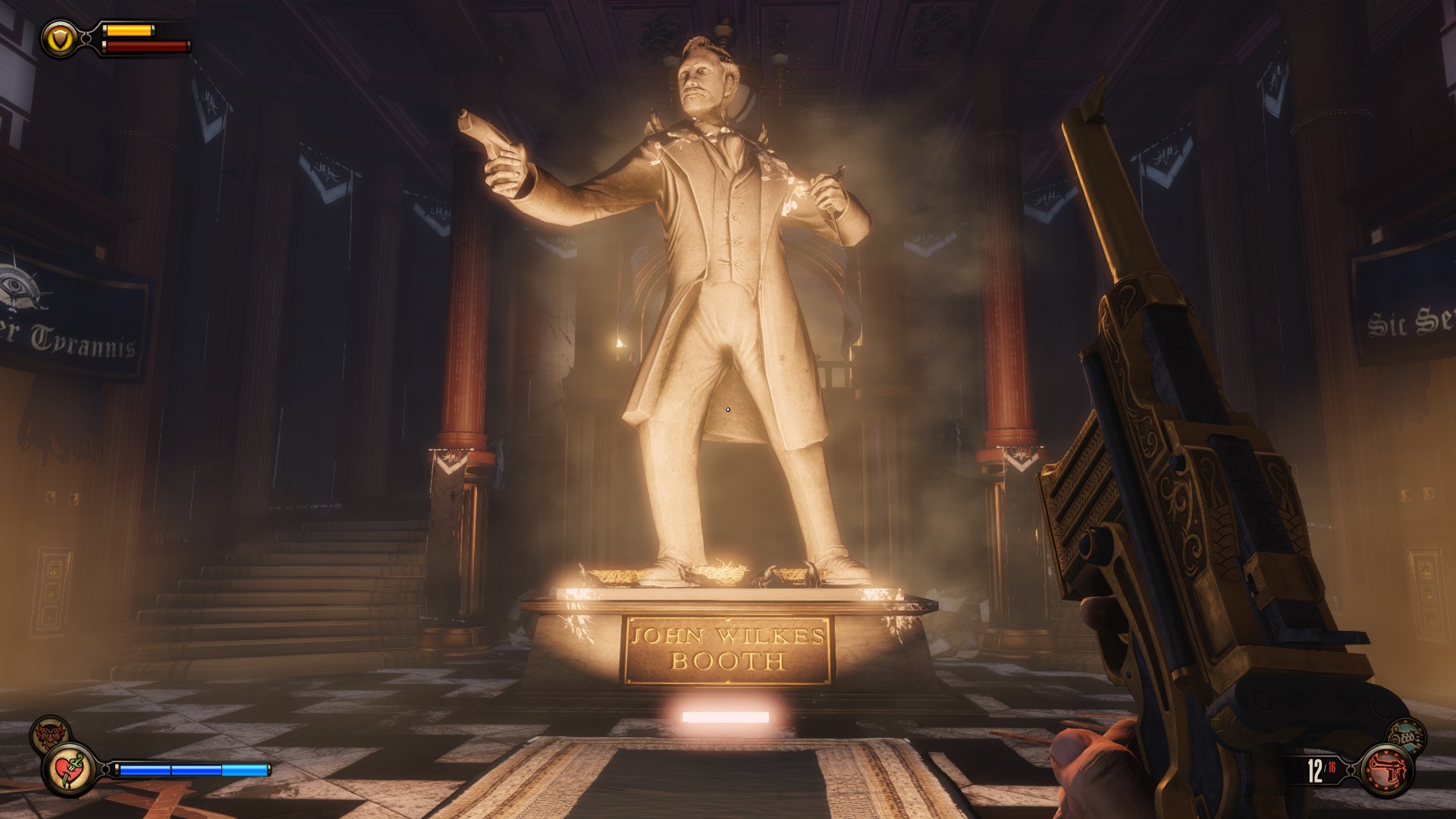
Columbia is a deeply racist place. The Founders remembering Lincoln’s assassin as a martyr.
Something I wish returned from previous games, is the ability to use recovery items at will instead of as soon as they are acquired.
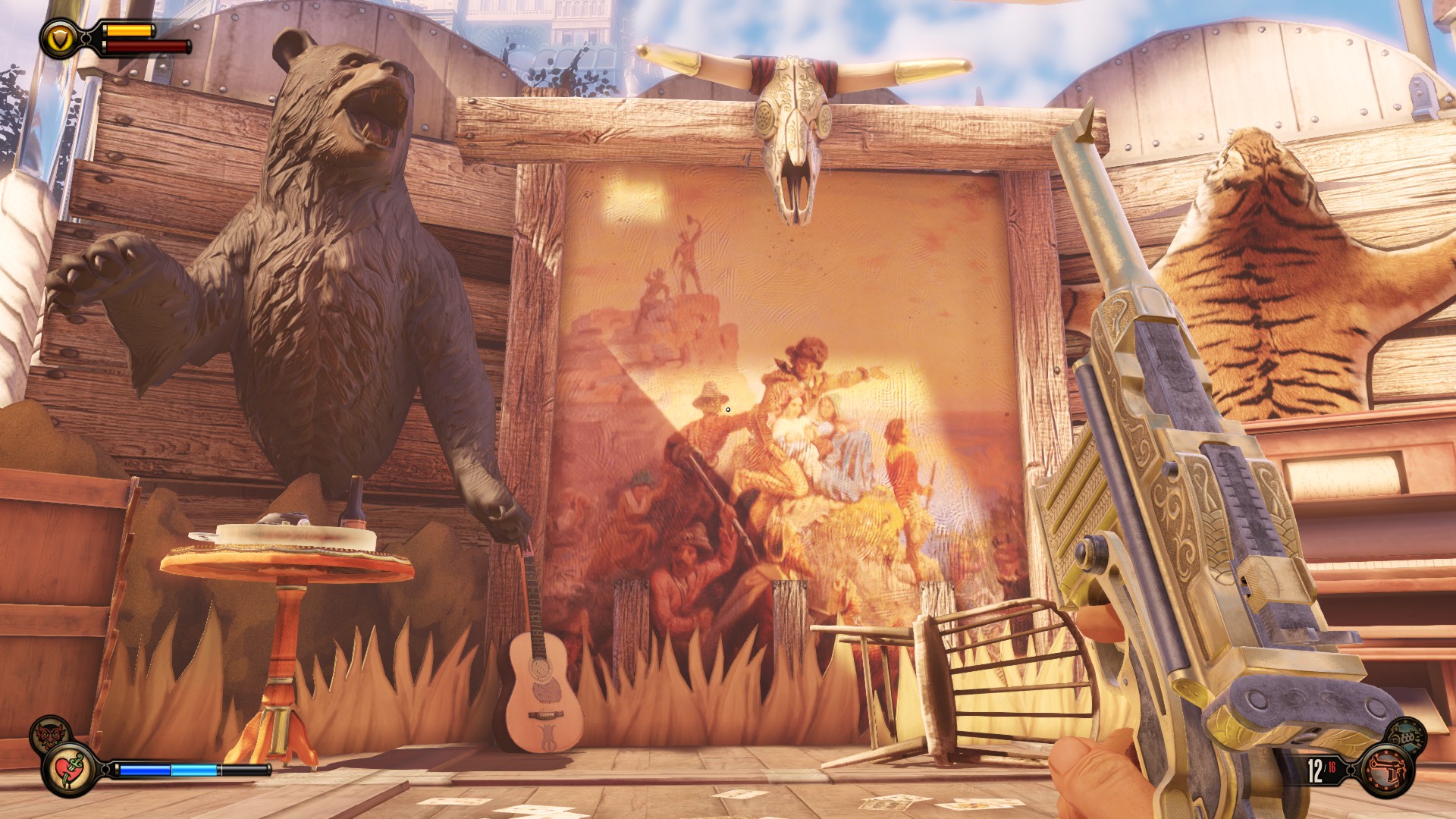
One entirely new gameplay feature in Infinite is a regenerating shield. It’s not a lot but it helps more than you think, absorbing the cheap shots an enemy might take before you can take cover.
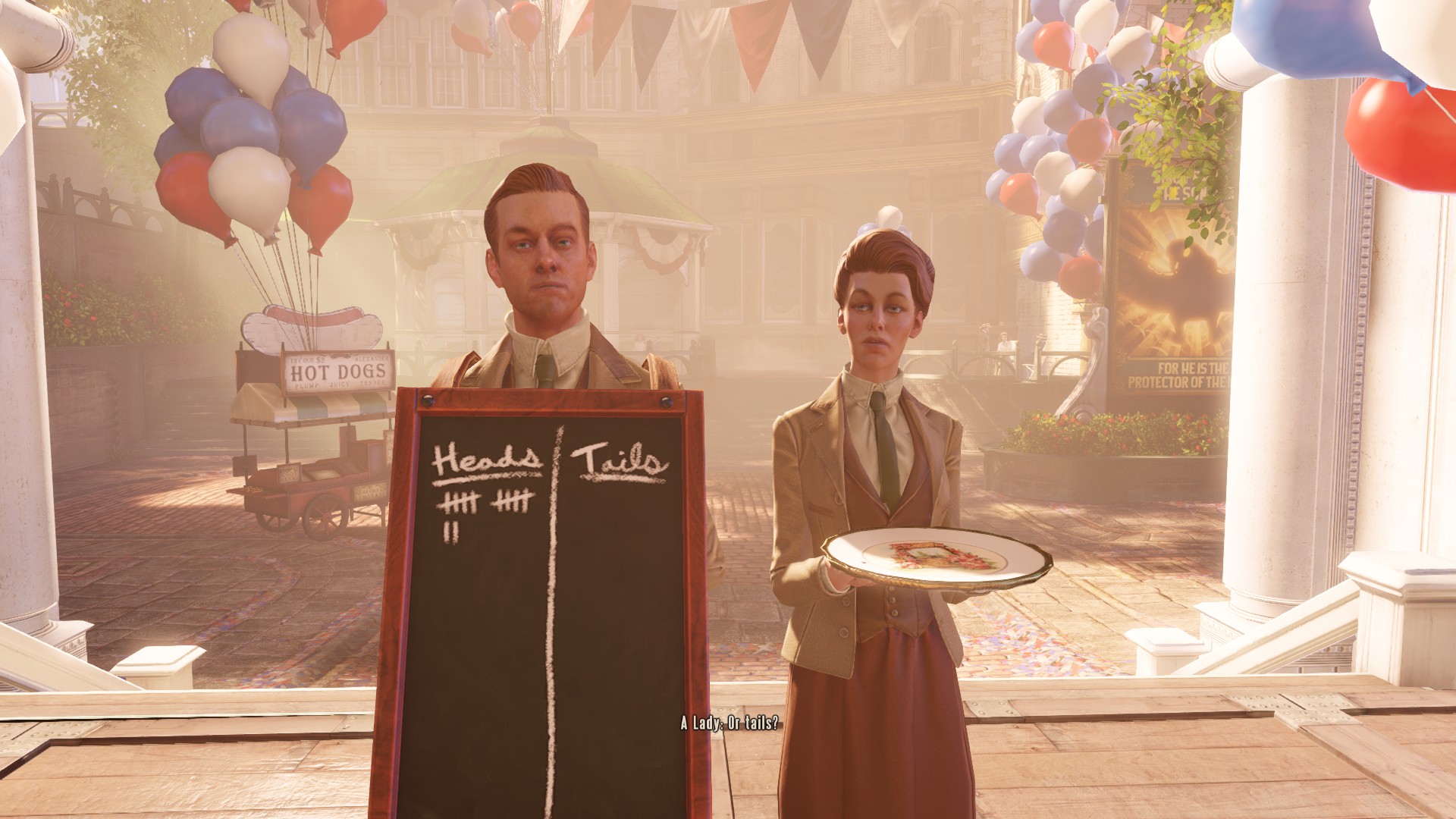
Your new shield is a courtesy of these two weirdos.
Skylines are another new feature that bears mention, feeling like roller coasters. While they operate on some of the flimsiest science of the series, they are a lot of fun.
I should add that this game’s equivalent of Plasmids, called Vigors, are not purchased, but rather unlocked as one progresses through the story.
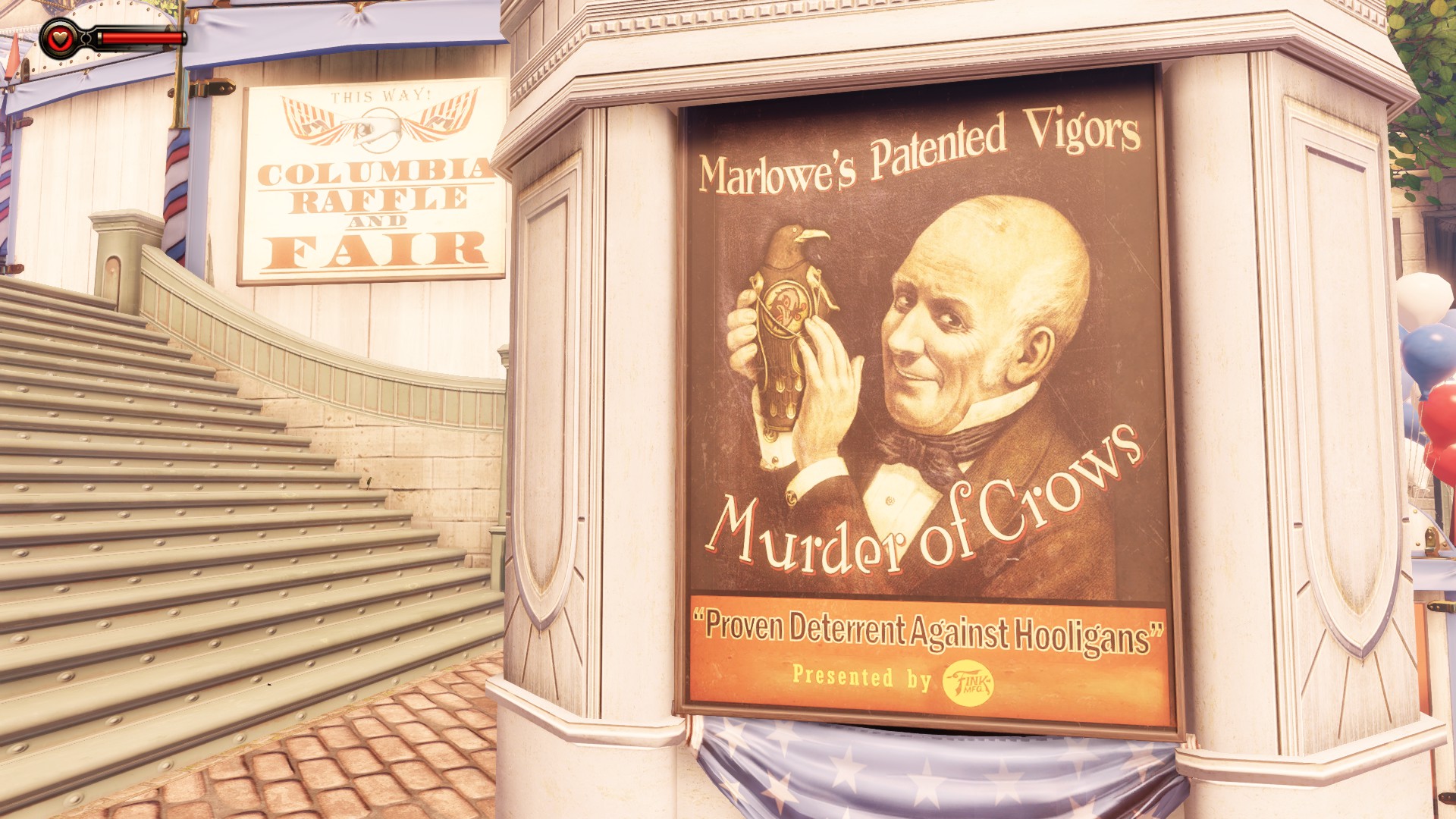
Drinkable plasmids in fancy bottles.
Elizabeth herself acts to facilitate several new game mechanics, one case being the ability to occasionally assist the player with ammo, health recovery, or “Salts” (This game’s Eve equivalent) when they are running low. The other major mechanic offered by Elizabeth’s presence is her ability to open “Tears”, torn patches of reality connecting Columbia to other versions of itself. Tears allow Elizabeth to pull objects into Booker’s reality that vary in many ways, such as summoning an ally or providing resources or cover or whatever else a player can use. Elizabeth’s power is immense, and a core aspect of the themes of the game, and its narrative, beyond simply being a game mechanic. Elizabeth is key to this game, as much as the player character himself.

Just like Rapture, Columbia is a wonder of science.
BioShock Infinite features a plot mirroring the two preceding games, with a cast of characters deliberately harkening back to Andrew Ryan, Sophia Lamb, Frank Fontaine, Dr Suchong, Atlas and others. The implication being that they are alternate or composite versions of those characters from a different timeline. Especially the industrialist Jeremiah Fink being a dead ringer for Andrew Ryan mixed with a bit of Frank Fontaine.
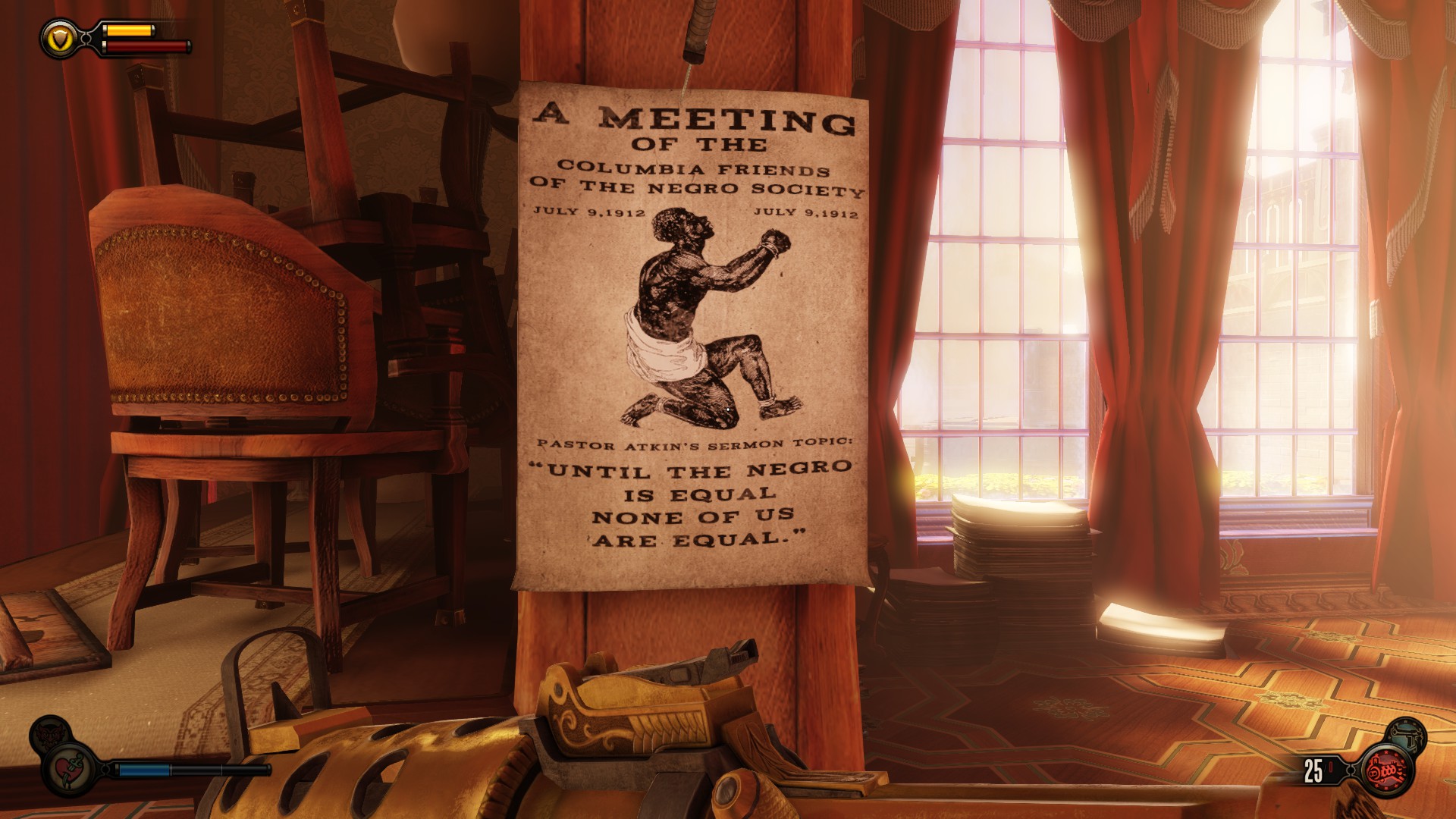
The Vox Populi, champion civil equality and oppose the racist policies of the Founders in Columbia.
Infinite goes somewhere neither previous entry really went. Religion. It expresses a surprisingly nuanced narrative about religion. Baptism and moral predestination are central themes to the story. While the time traveling, reality warping hijinks may fall flat for some folk, I very much think this game isn’t praised enough for the religious allegory inherent to its plot. Forgiveness, redemption, accepting accountability, it’s all explored here thematically by way of Booker Dewitt, as well as in his nemesis, Zachary Comstock.
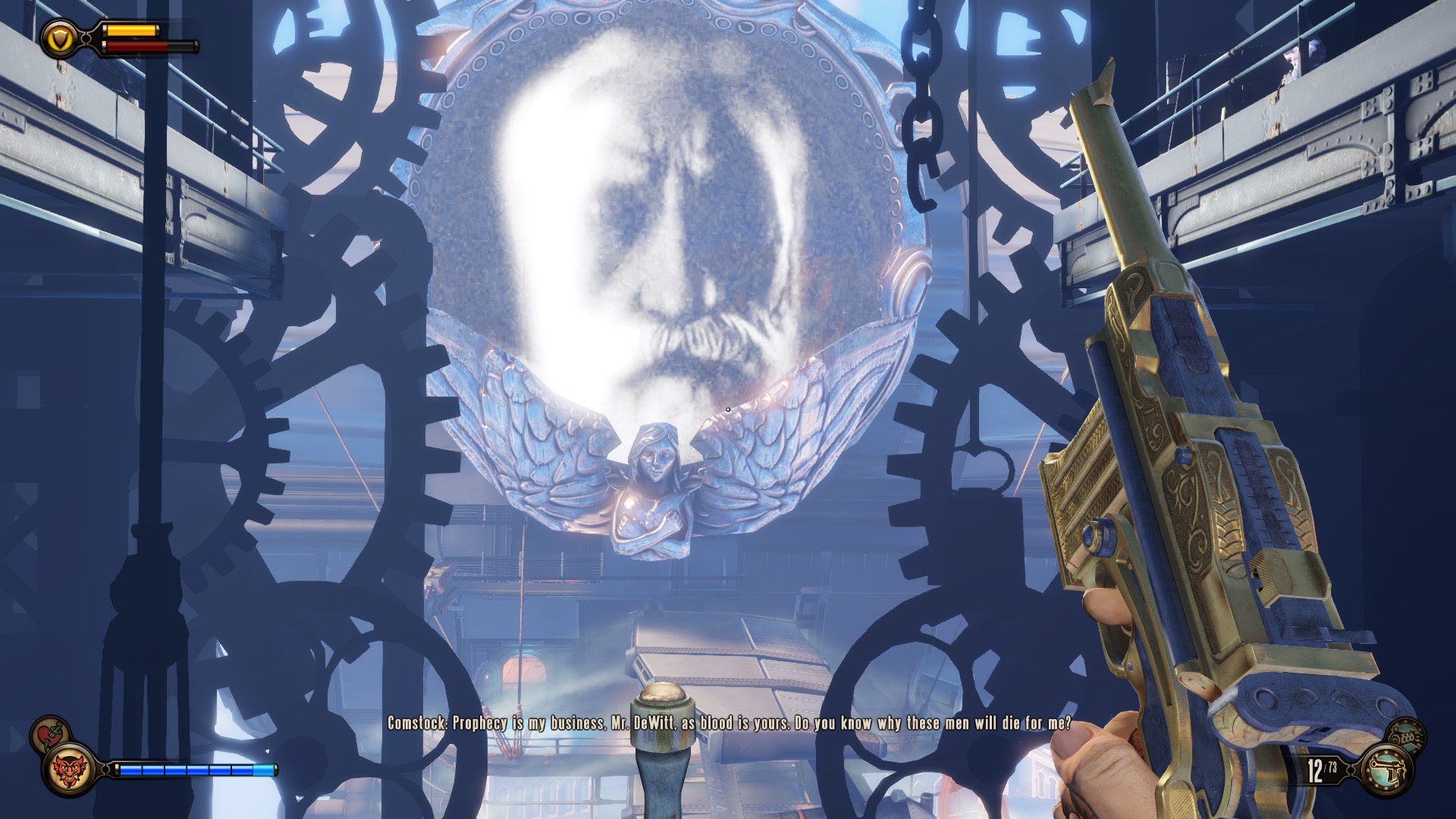
Comstock is treated as the leader of Columbia, and seen as a divine figure.
Overall Infinite feels out of place within the trilogy, ditching many of the immersive sim aspects in favor of more straightforward gameplay. However, I don’t see that as a bad thing. It’s not a bad game for ditching series conventions. Infinite is heavily criticized now for not continuing the immersive sim aspects that many see as defining the original 2 games, but I feel that judgement is more than a little unfair. Combat in Infinite feels more rewarding than ever, and the story beats mirror the original games beautifully. This in spite of dropping the original weapon wheel in favor of carrying 2 guns at a time, which I think was done to keep pace with modern shooters.

Propaganda is everywhere in Columbia.
In fact, an entire DLC dedicated to the joys of Infinite’s combat was created called “Clash in the Clouds” and it’s been a fantastic time on its own for me. Infinite also spawned a 2 part DLC campaign called “Burial at Sea” which I’ll cover in a later article.
Infinite is different, but leans well into its strengths as an action game. It’s the thematic elements of the plot and characters that really bind it, however tangentially, to the rest of the BioShock canon.
All Together Now
BioShock as a series holds a special place in my heart, and I wanted to make this overview of the series to hopefully persuade some folk to give it a go, highlighting the strengths of each game. A friend of mine has only ever played BioShock 2 and Infinite. Another only the first BioShock. And I know a few that have only played Infinite. But the universal opinion of my friends is always that BioShock never disappoints overall. There is no especially weak entry in the series. And I’m hoping that that holds true as we get closer to seeing BioShock 4.
So if you haven’t already, would you kindly give BioShock a try?

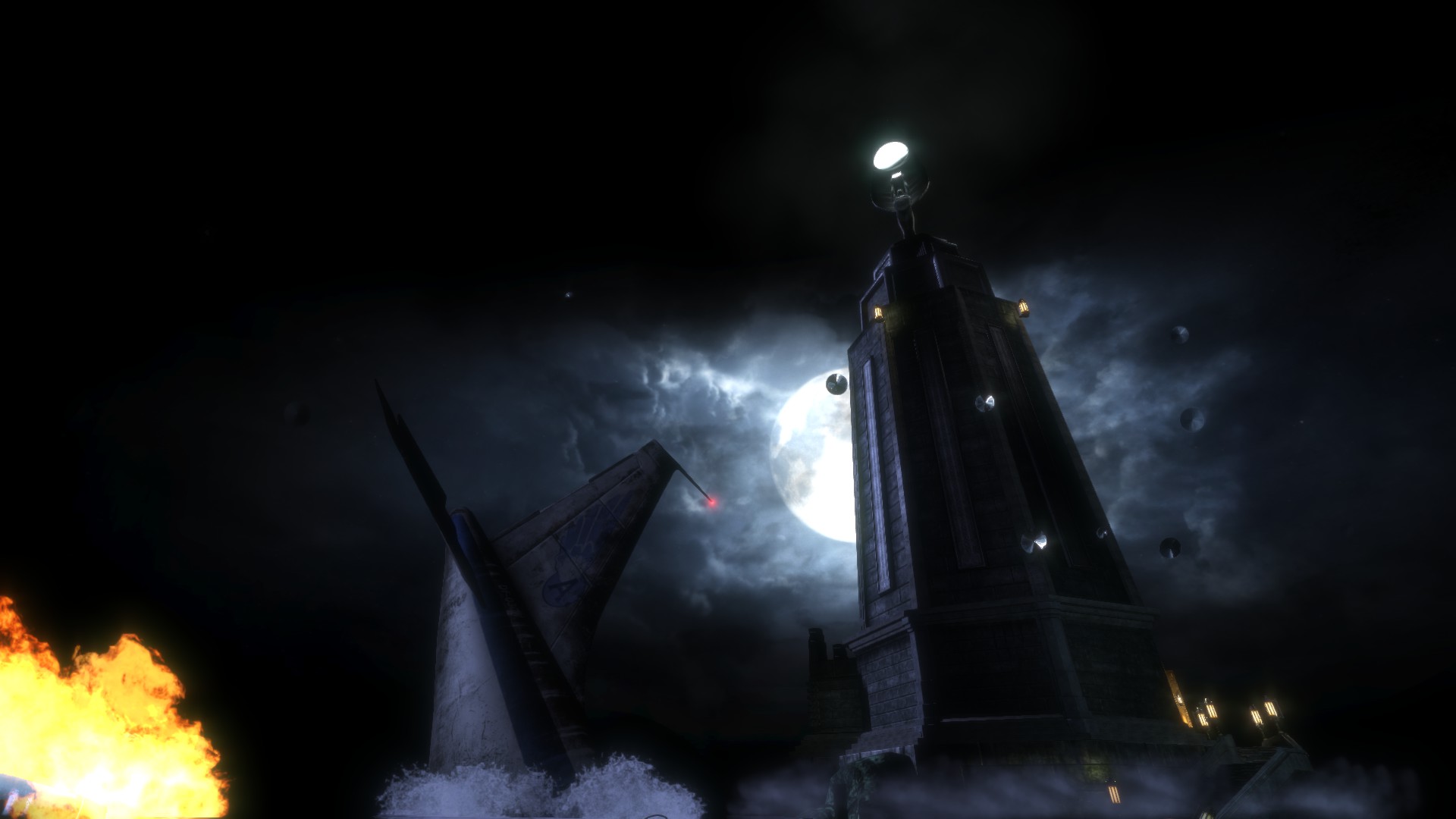
Comments are closed.